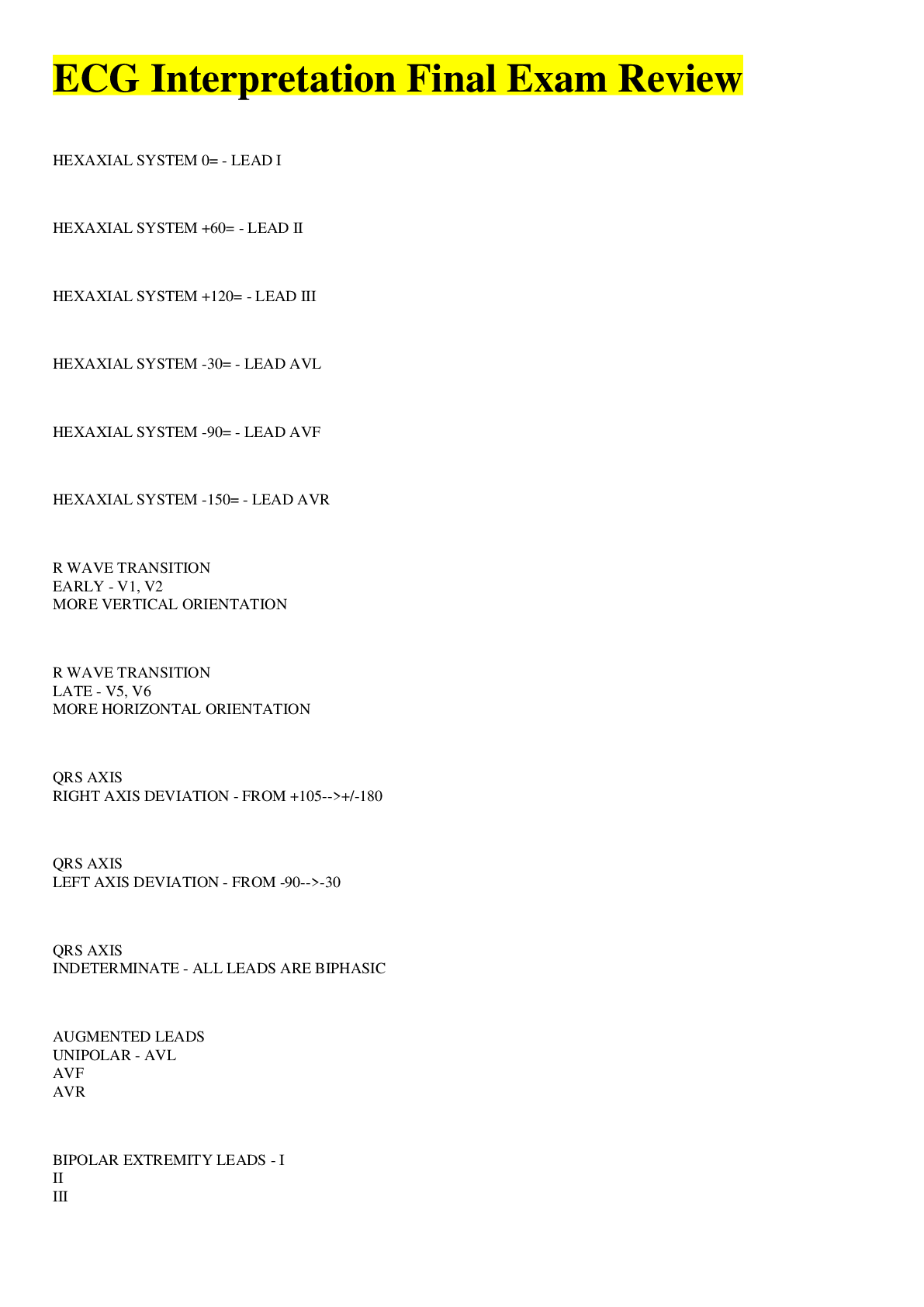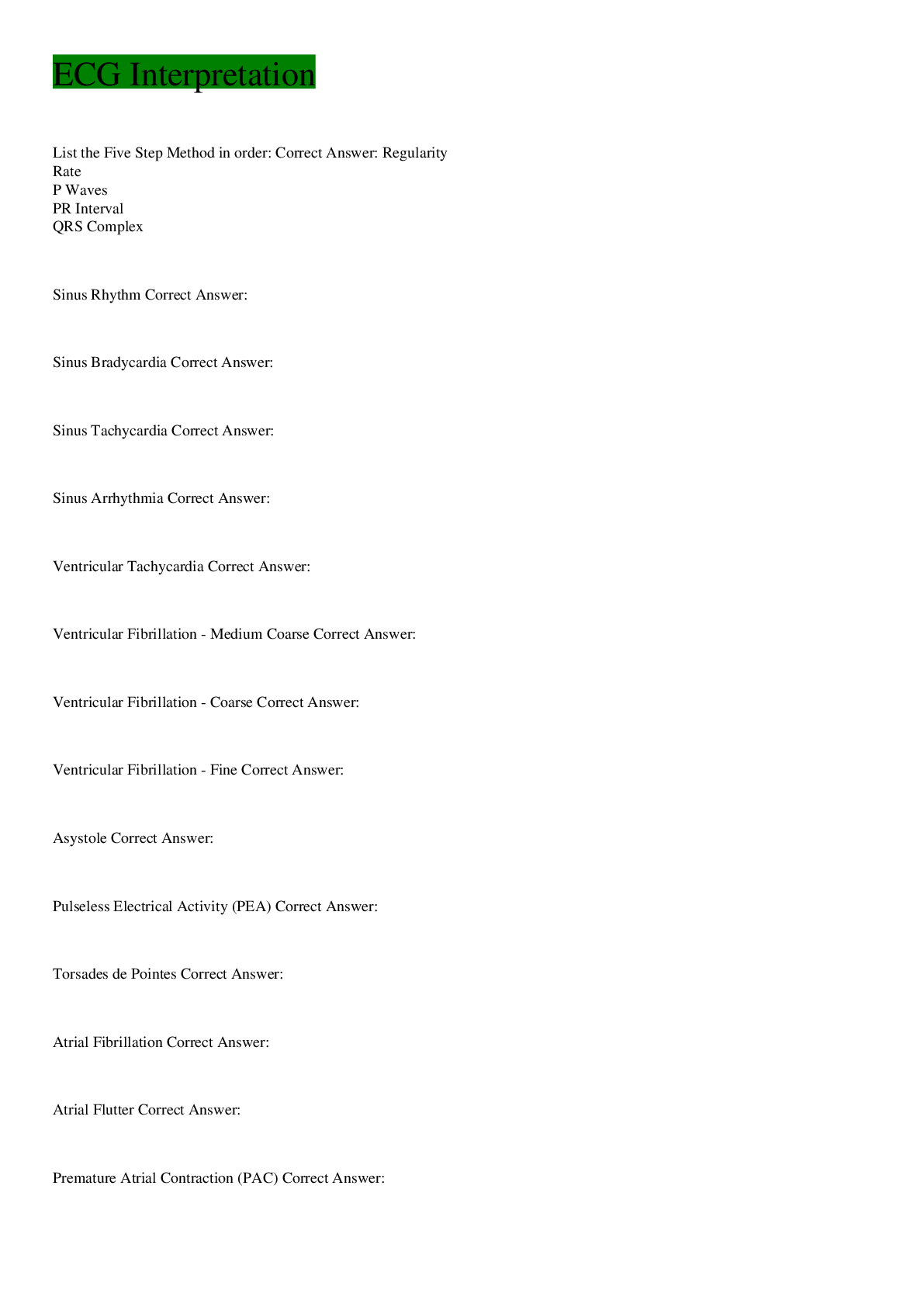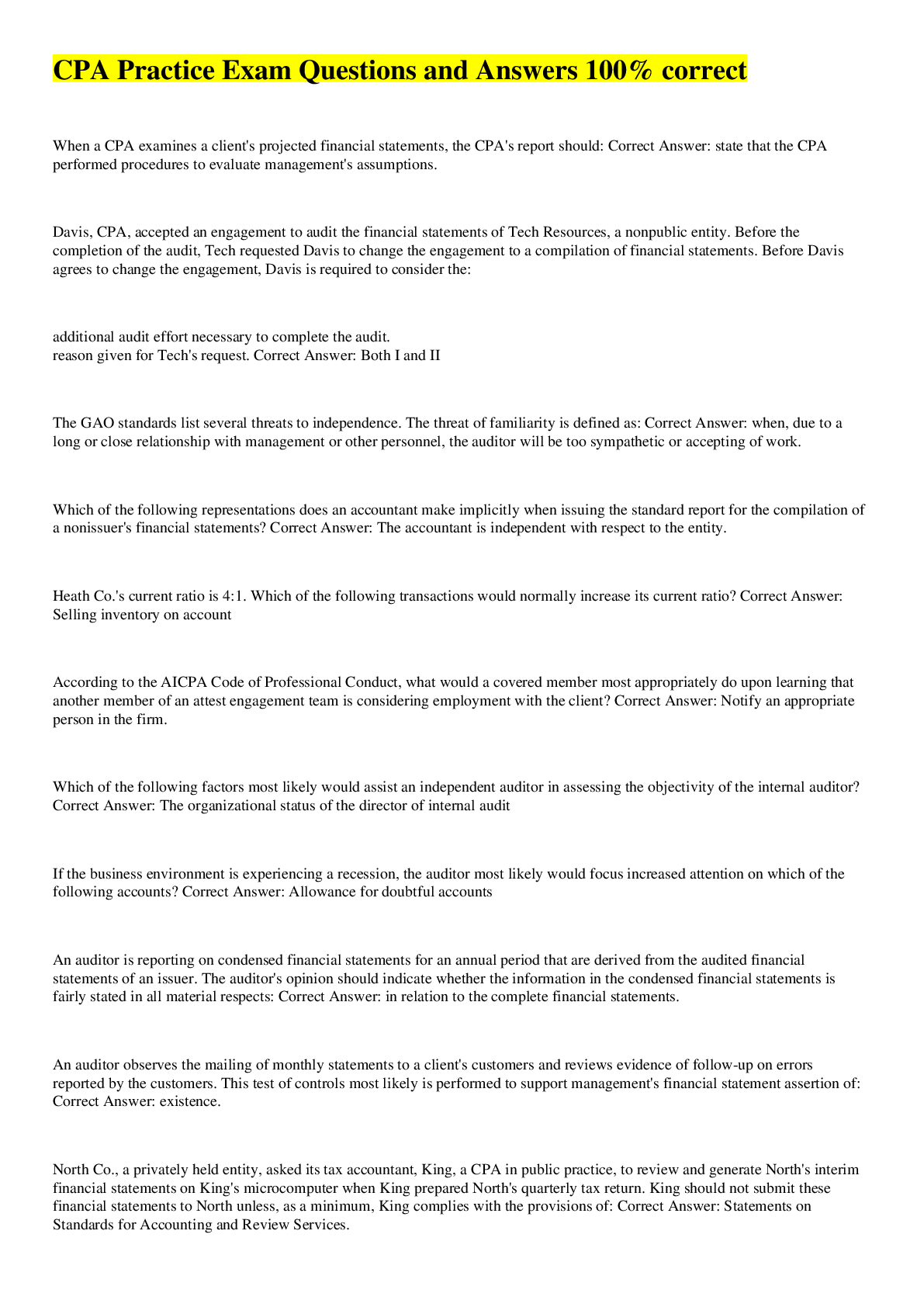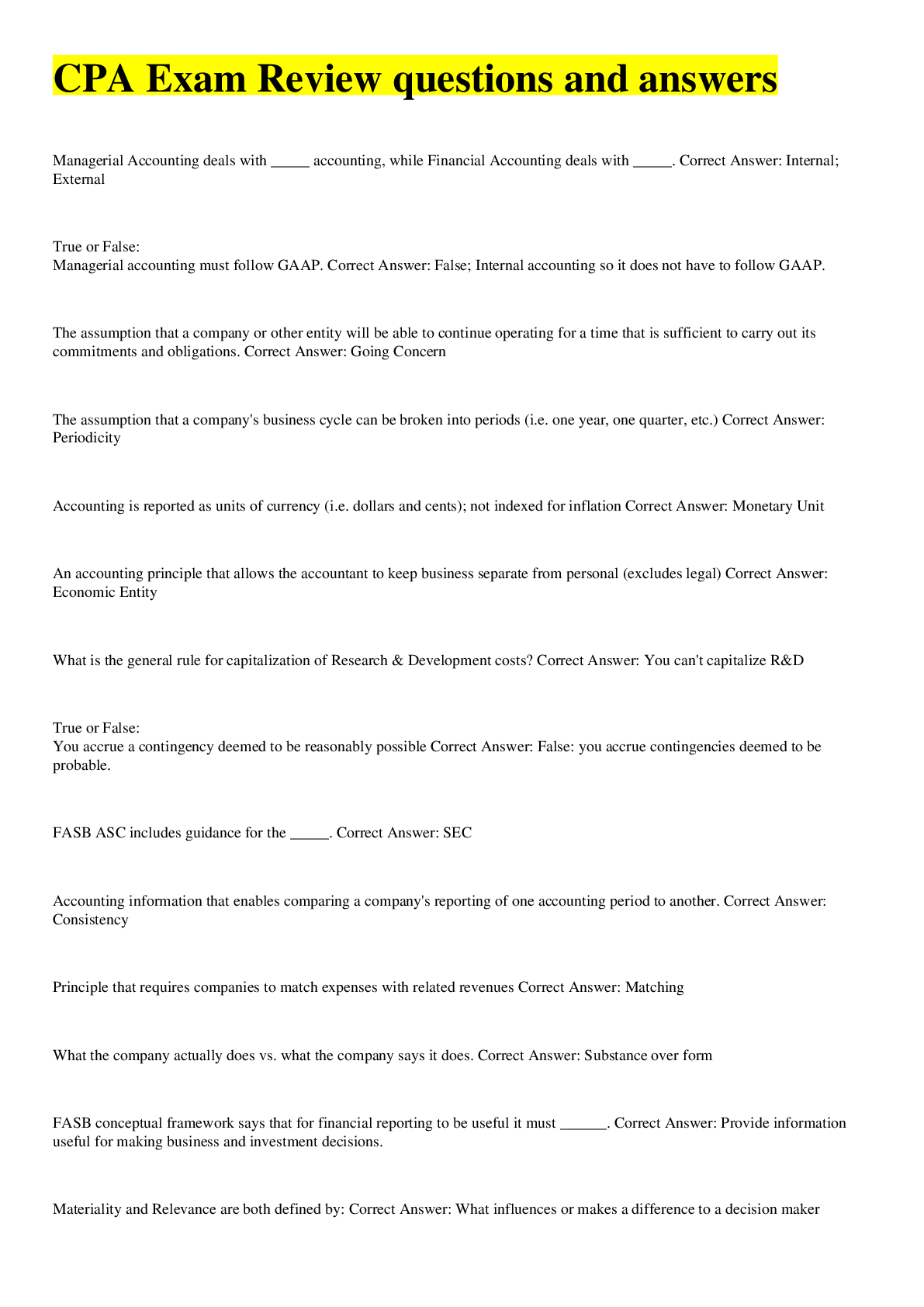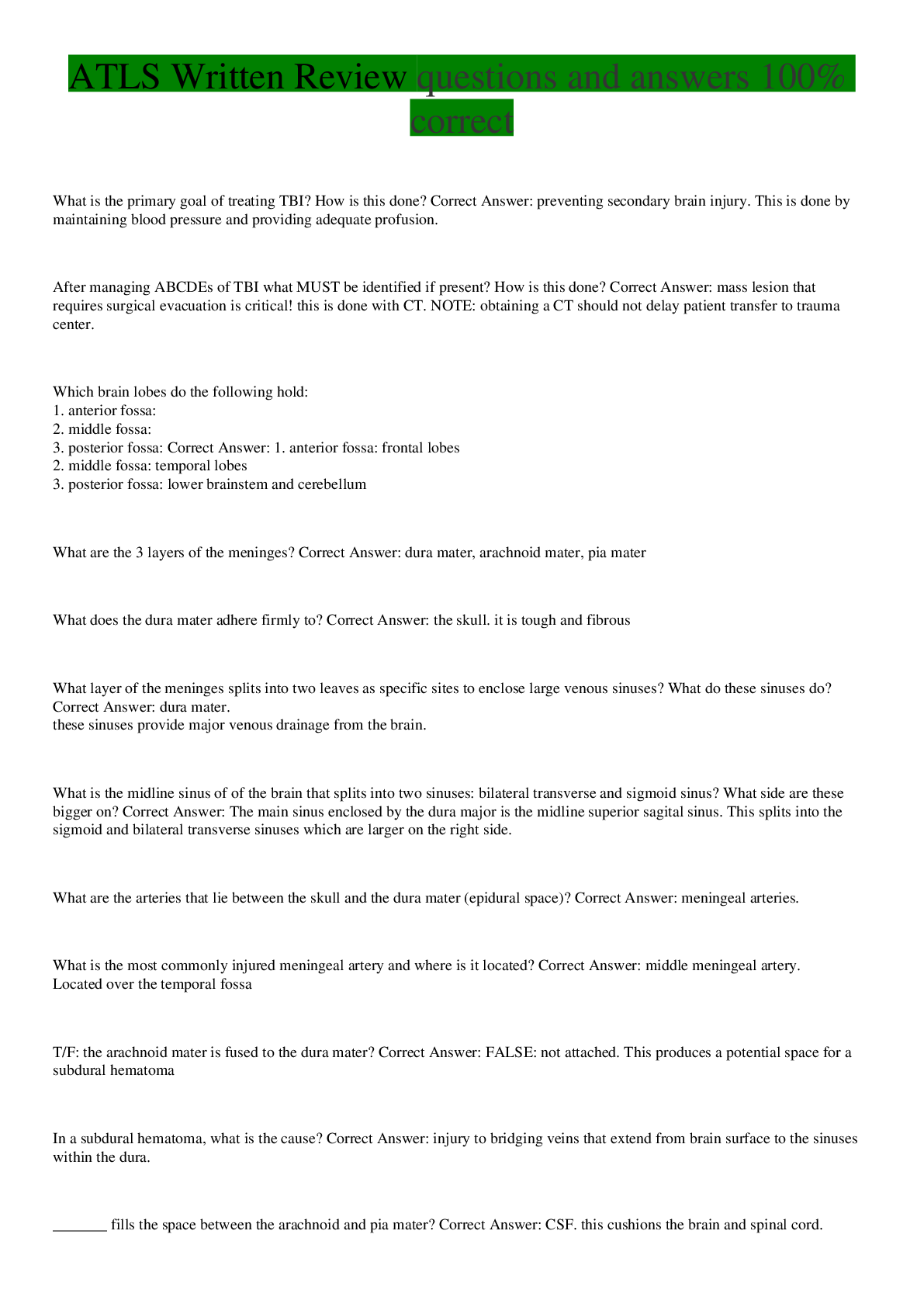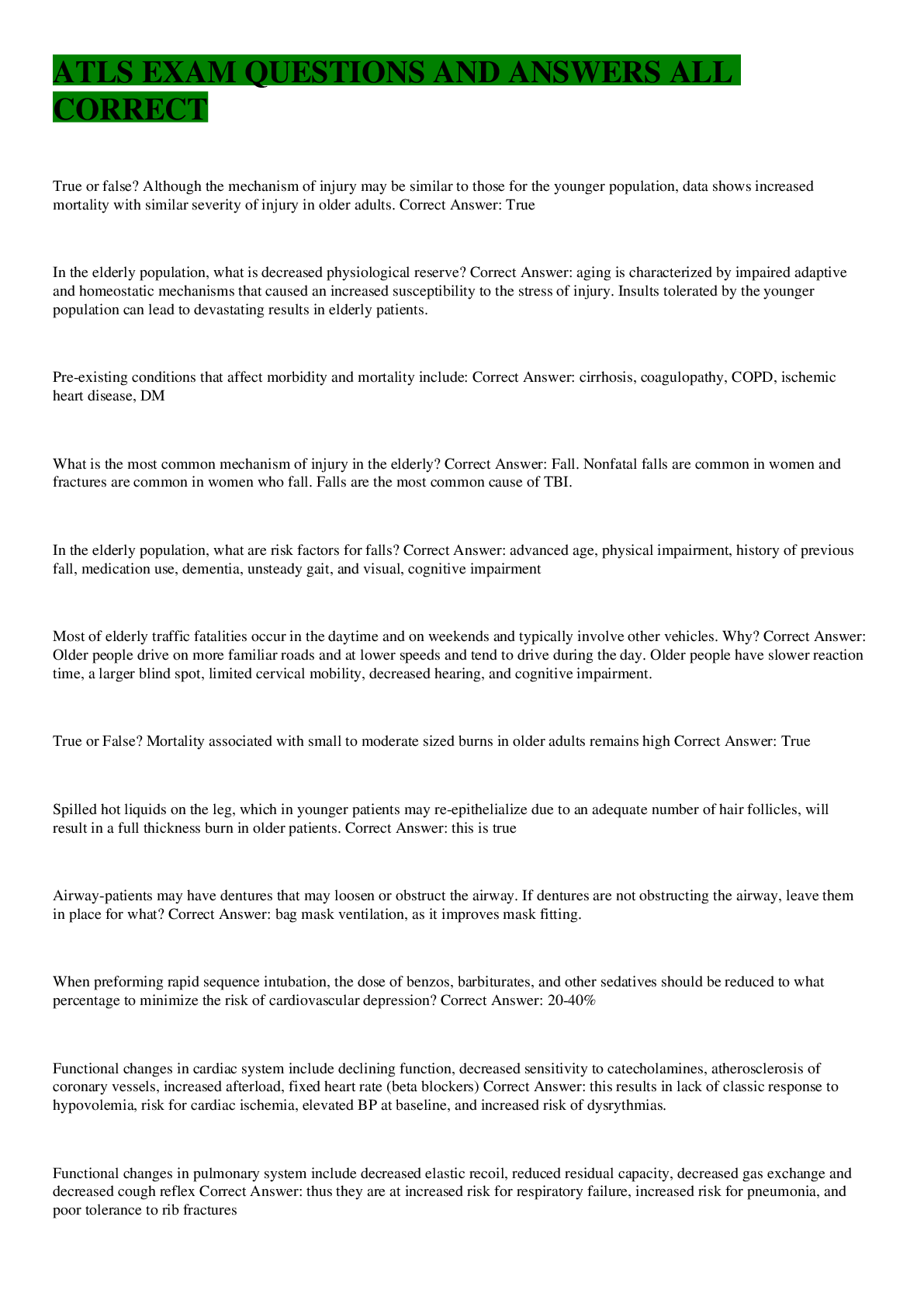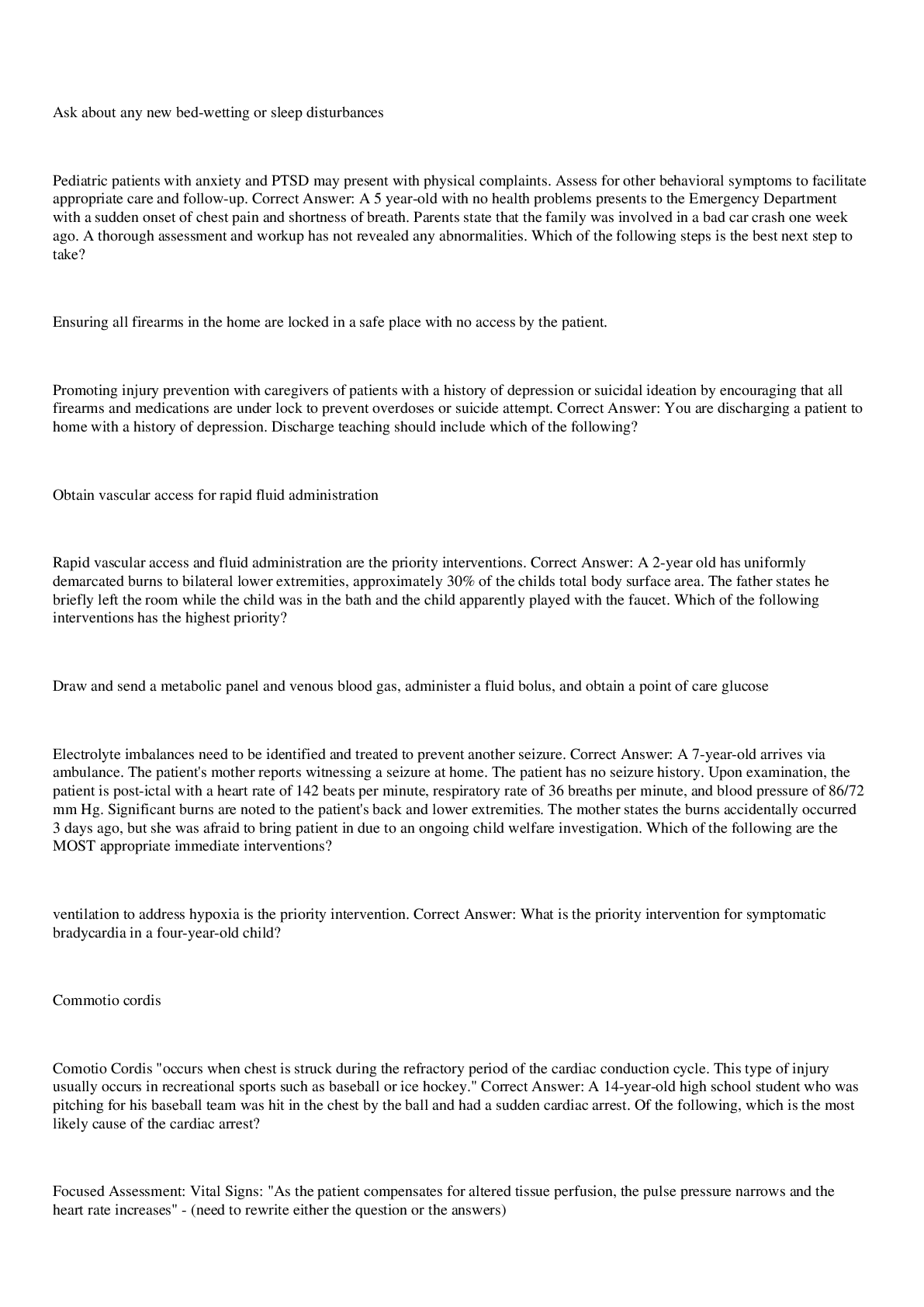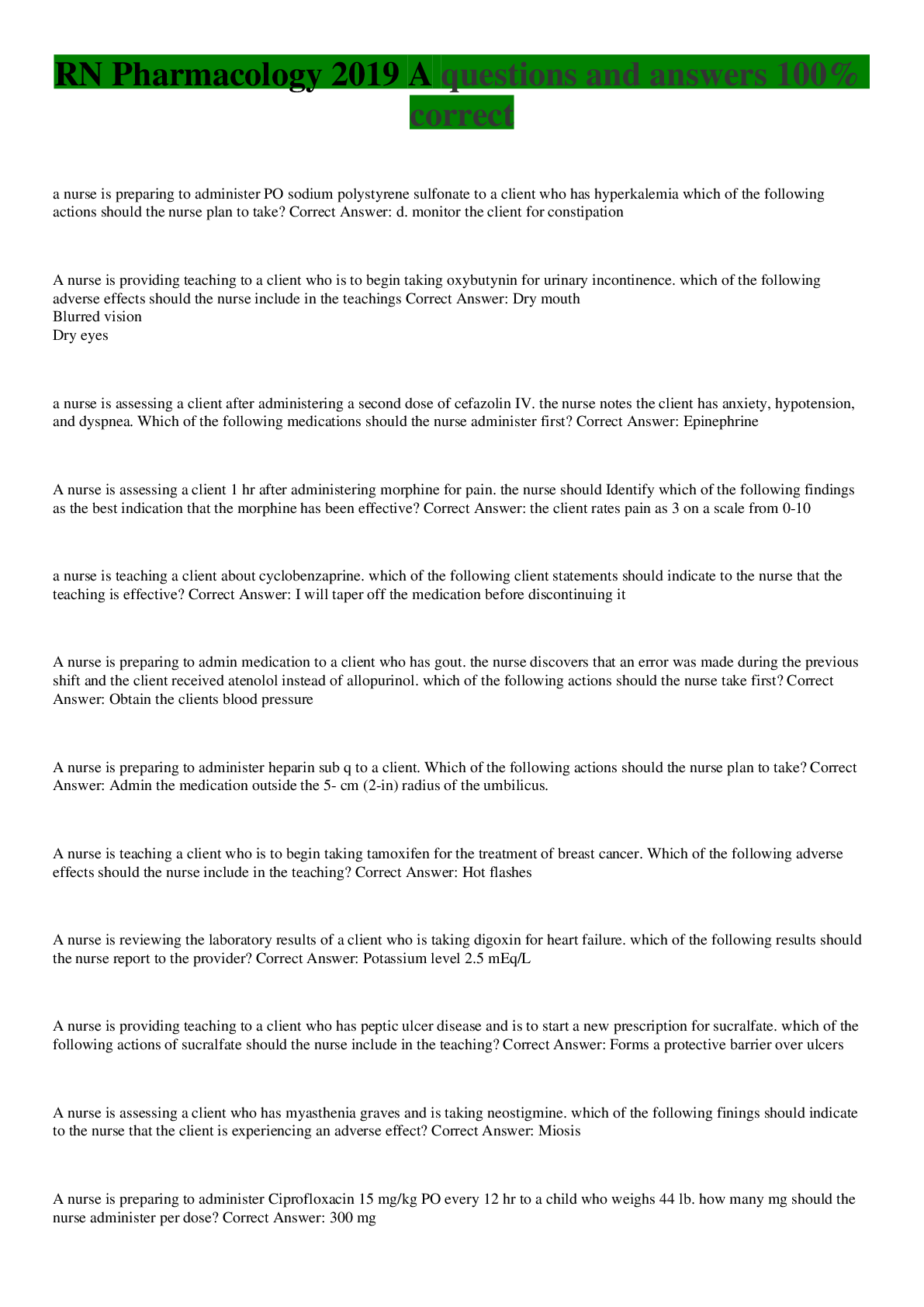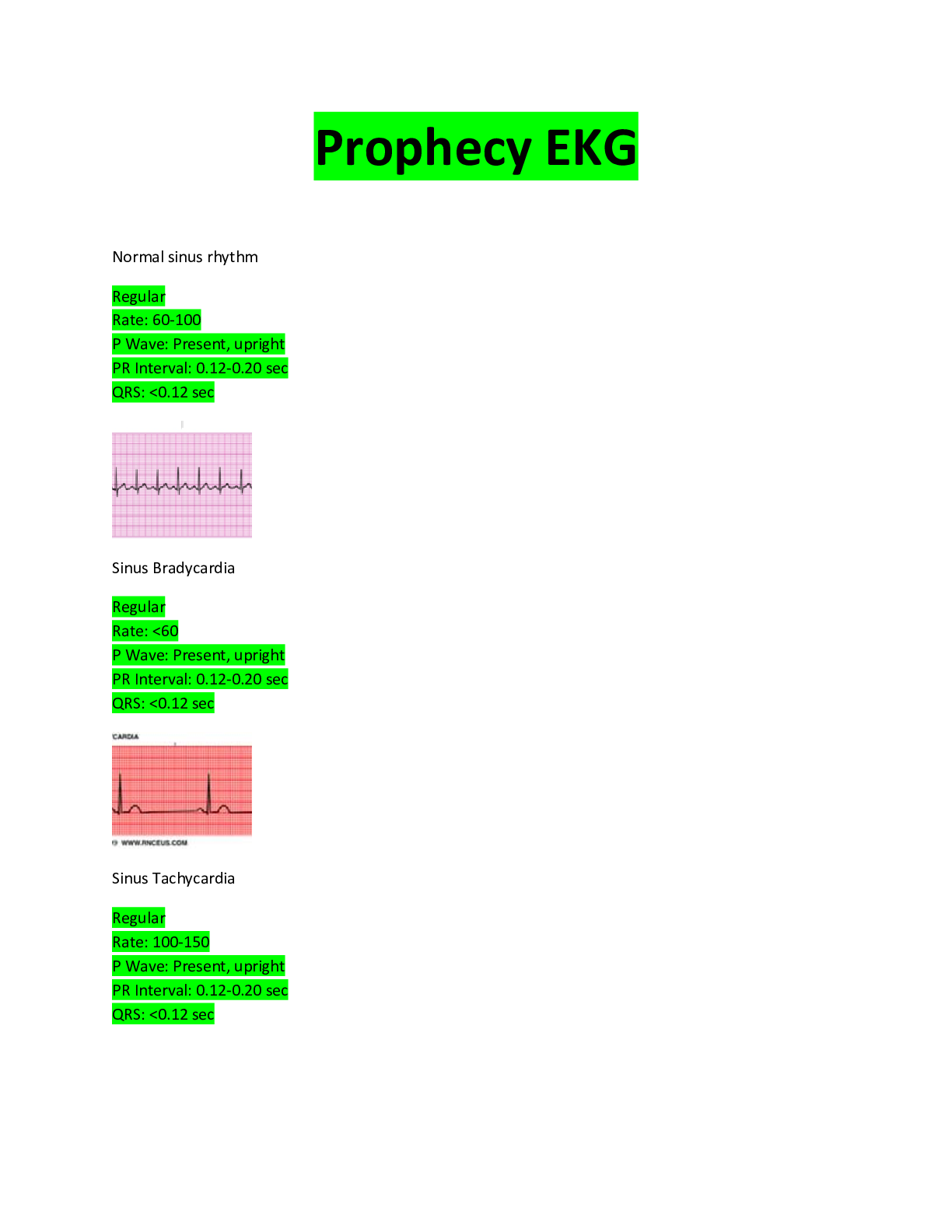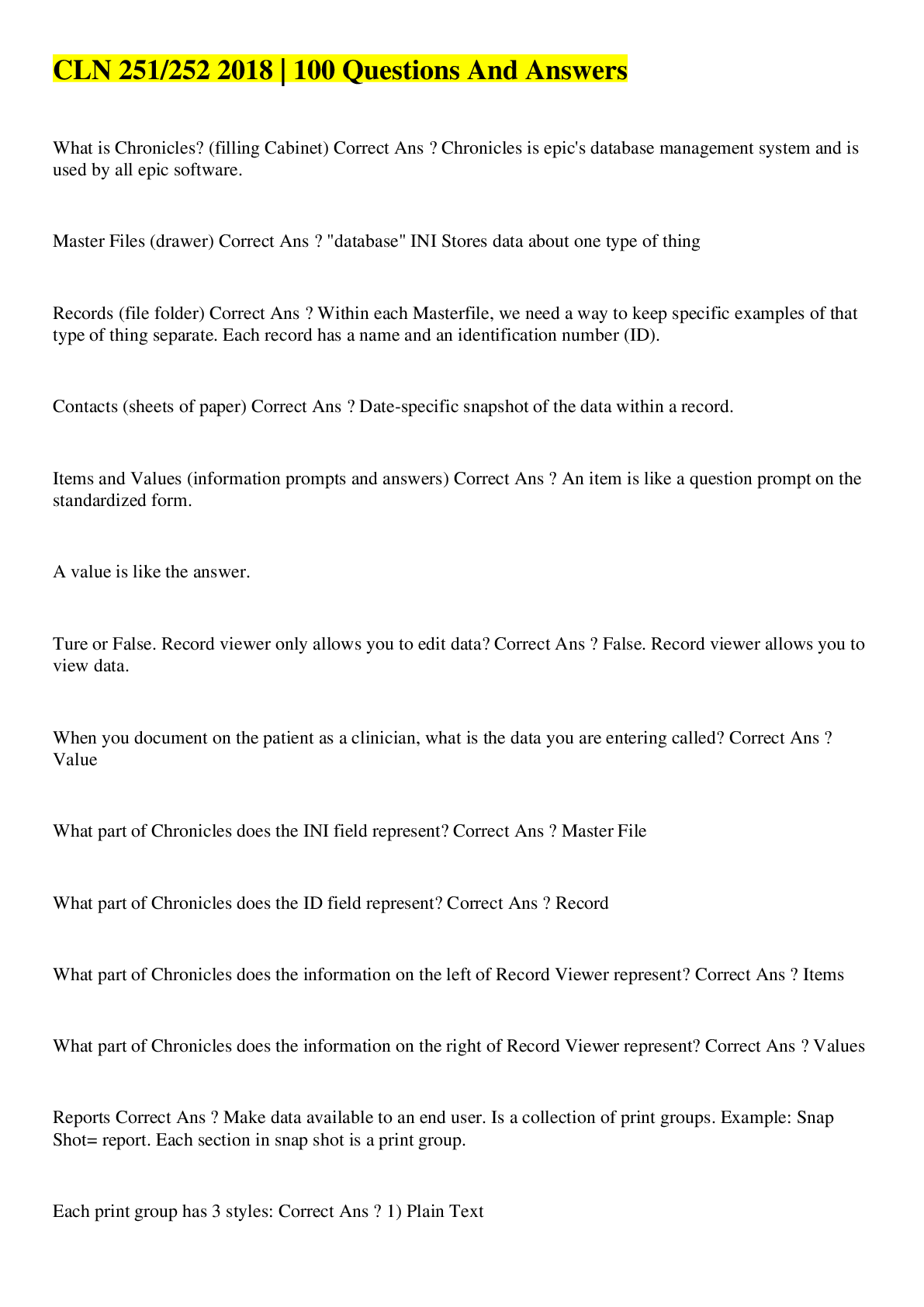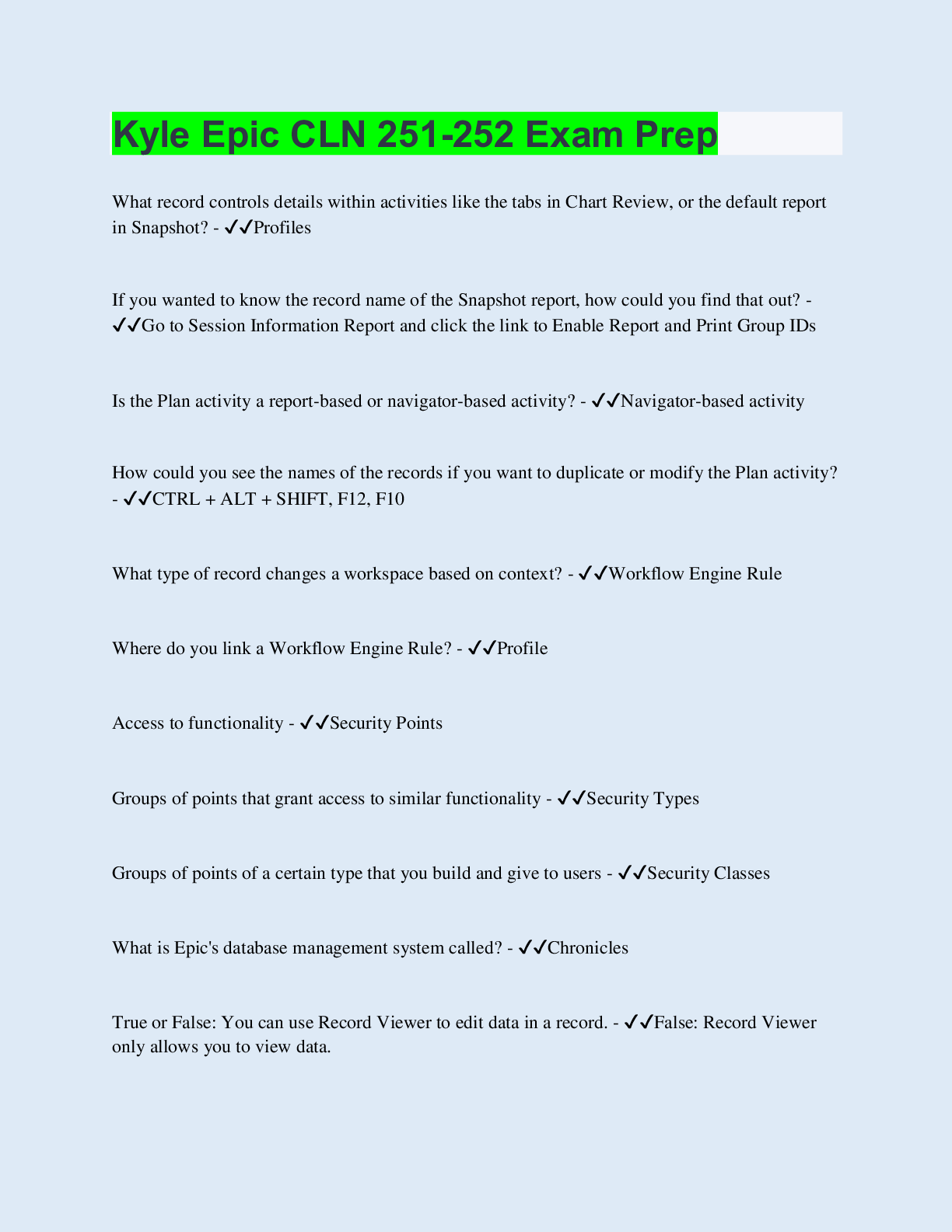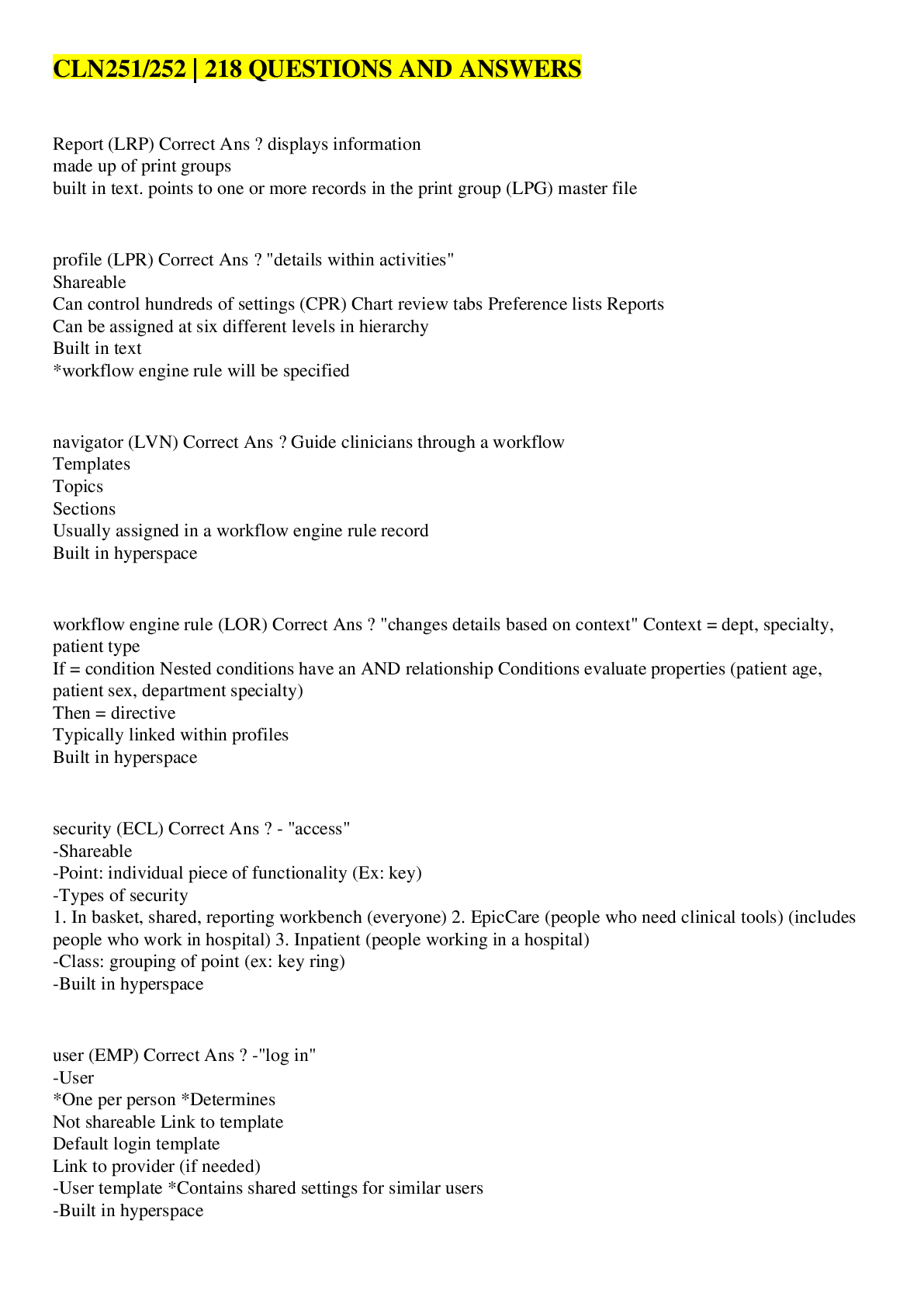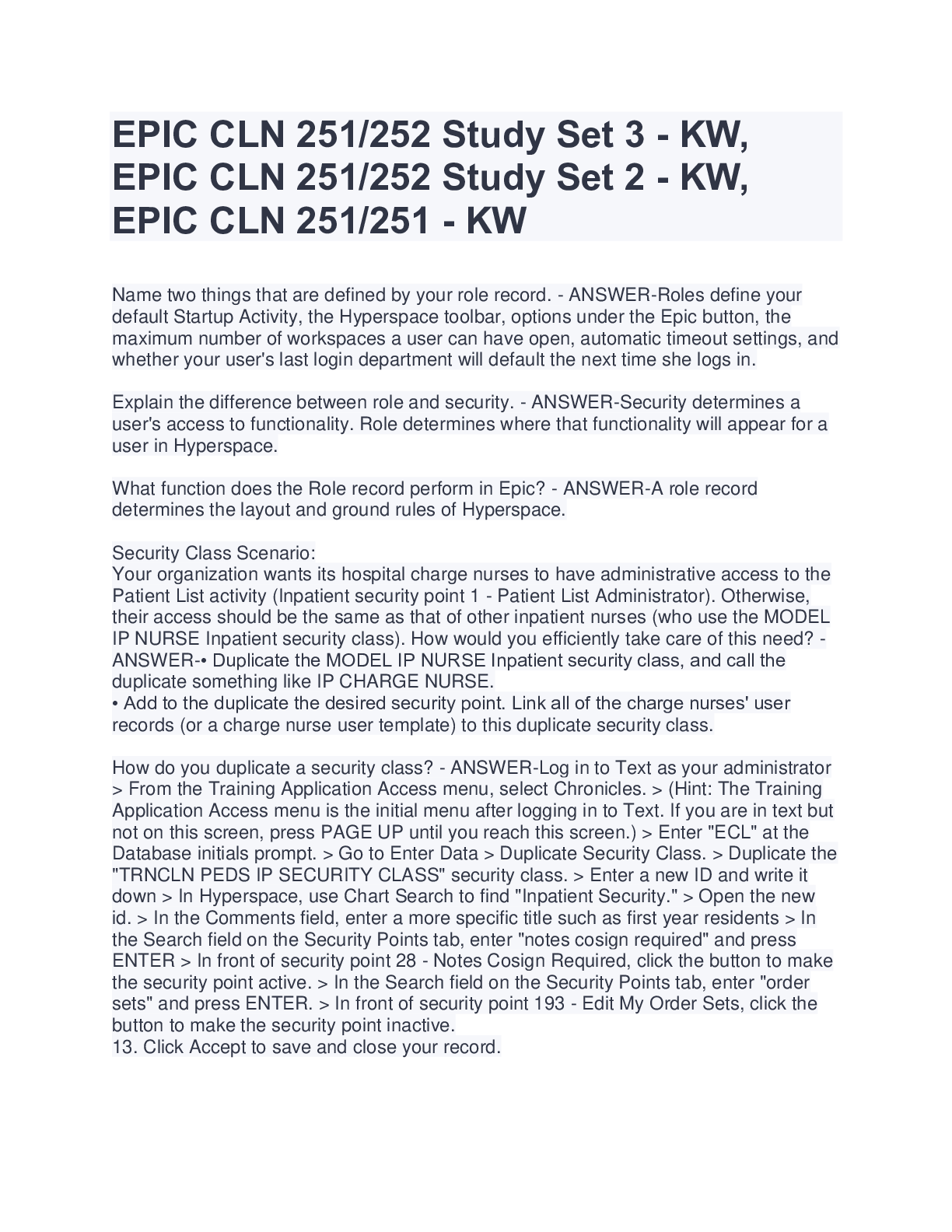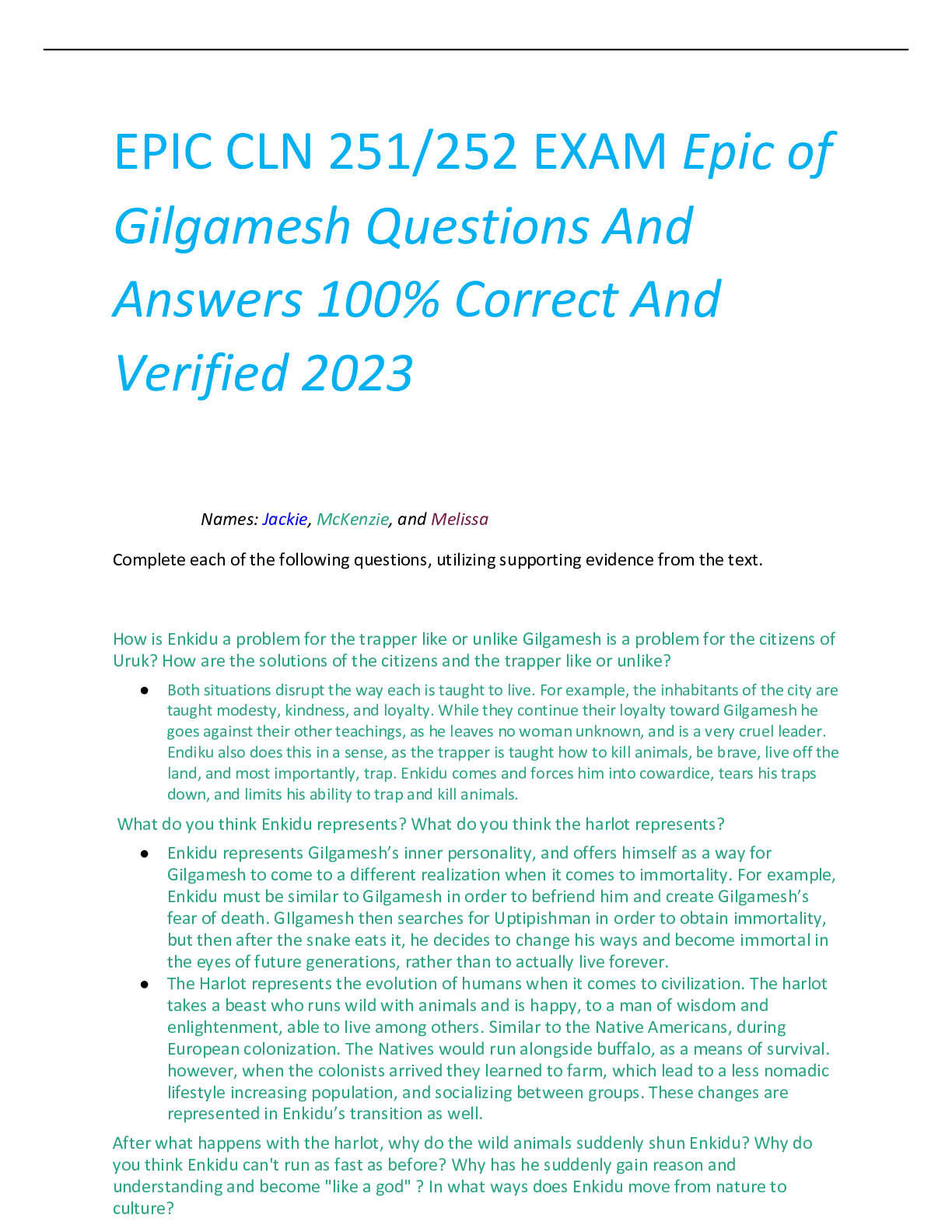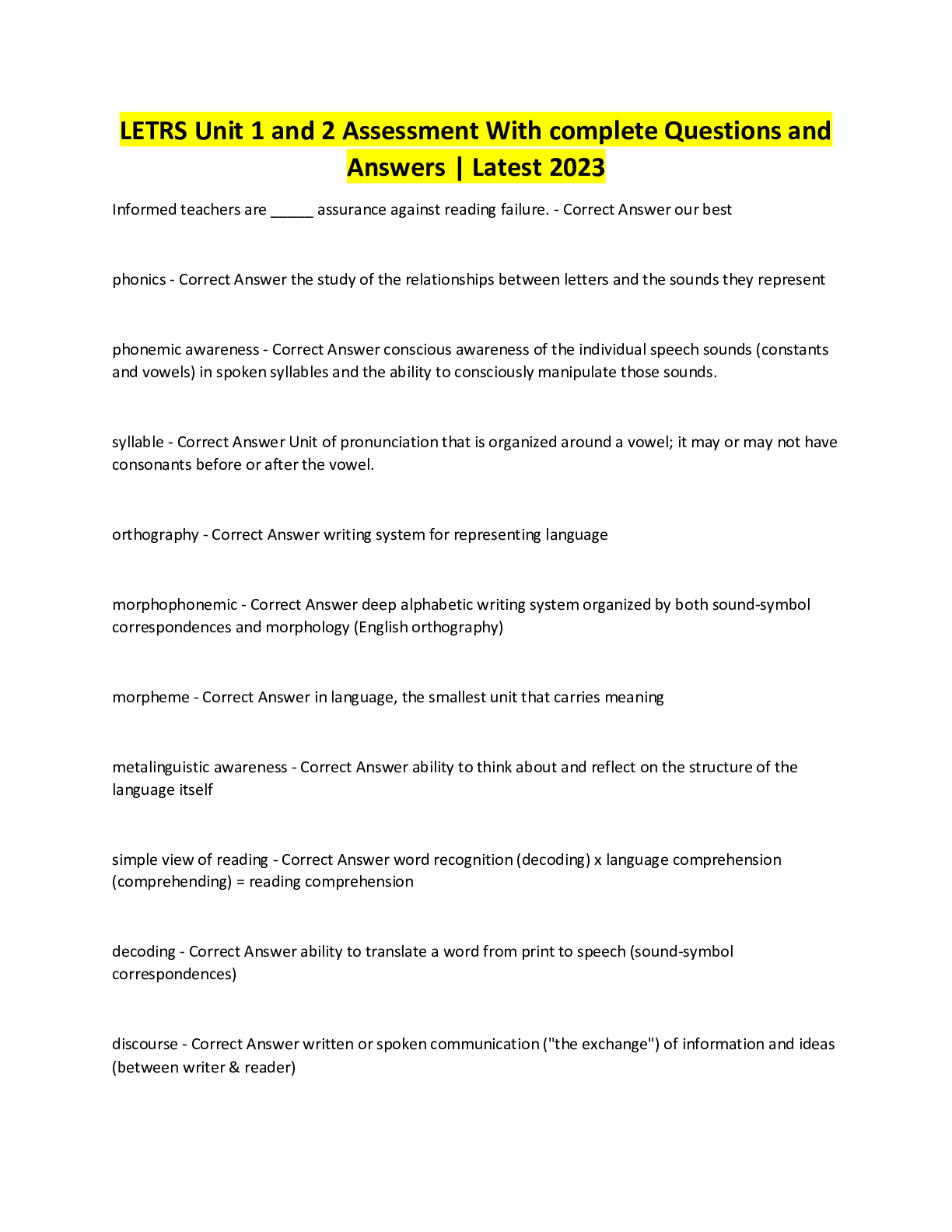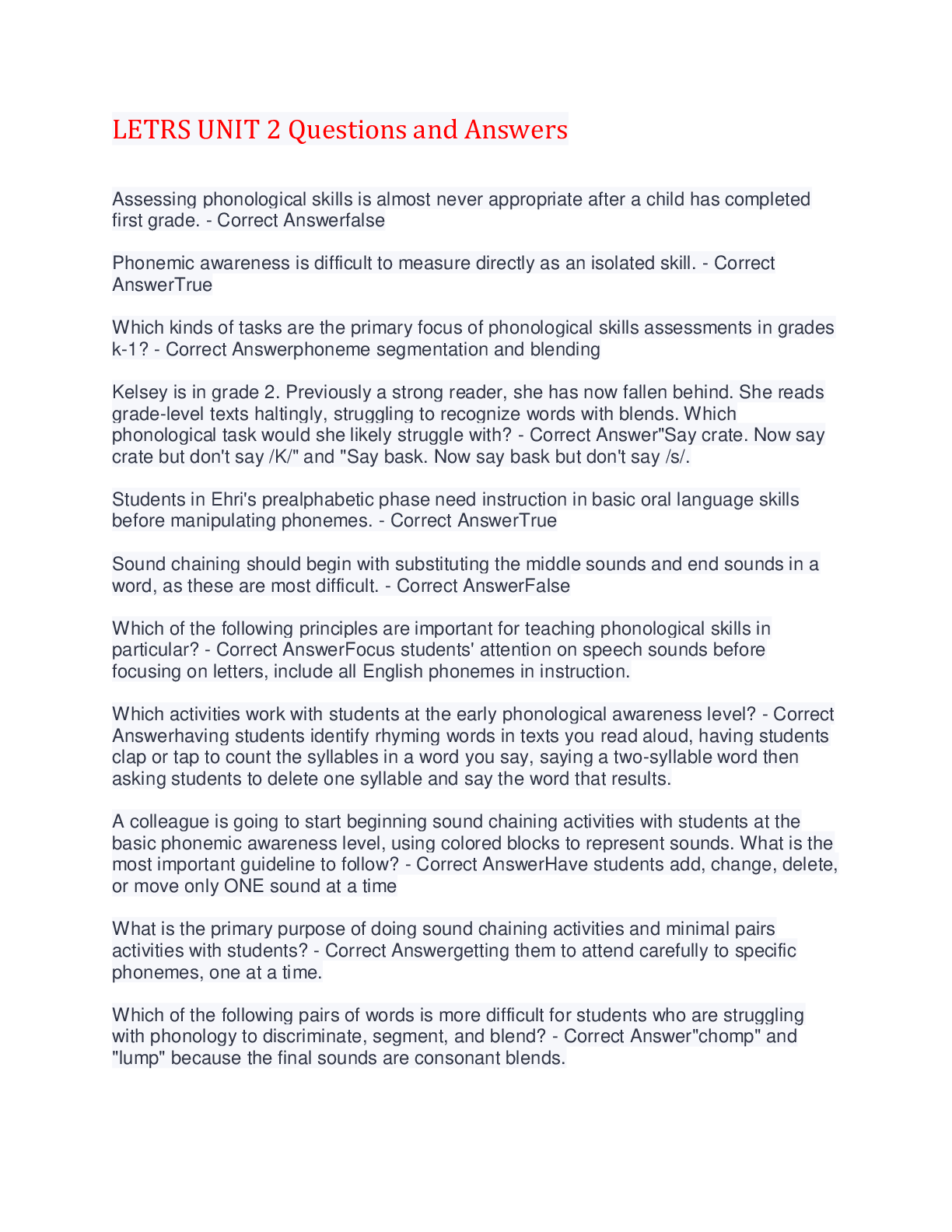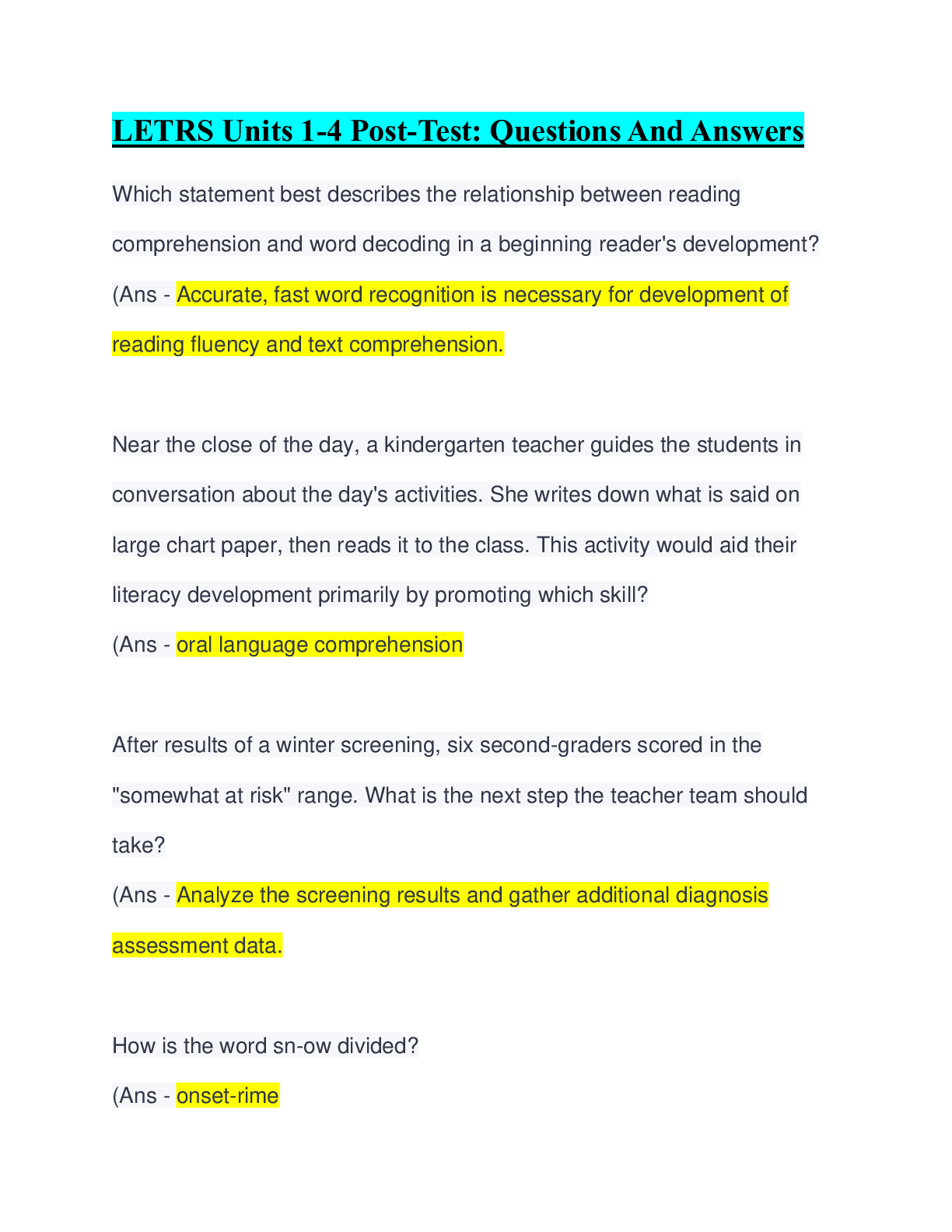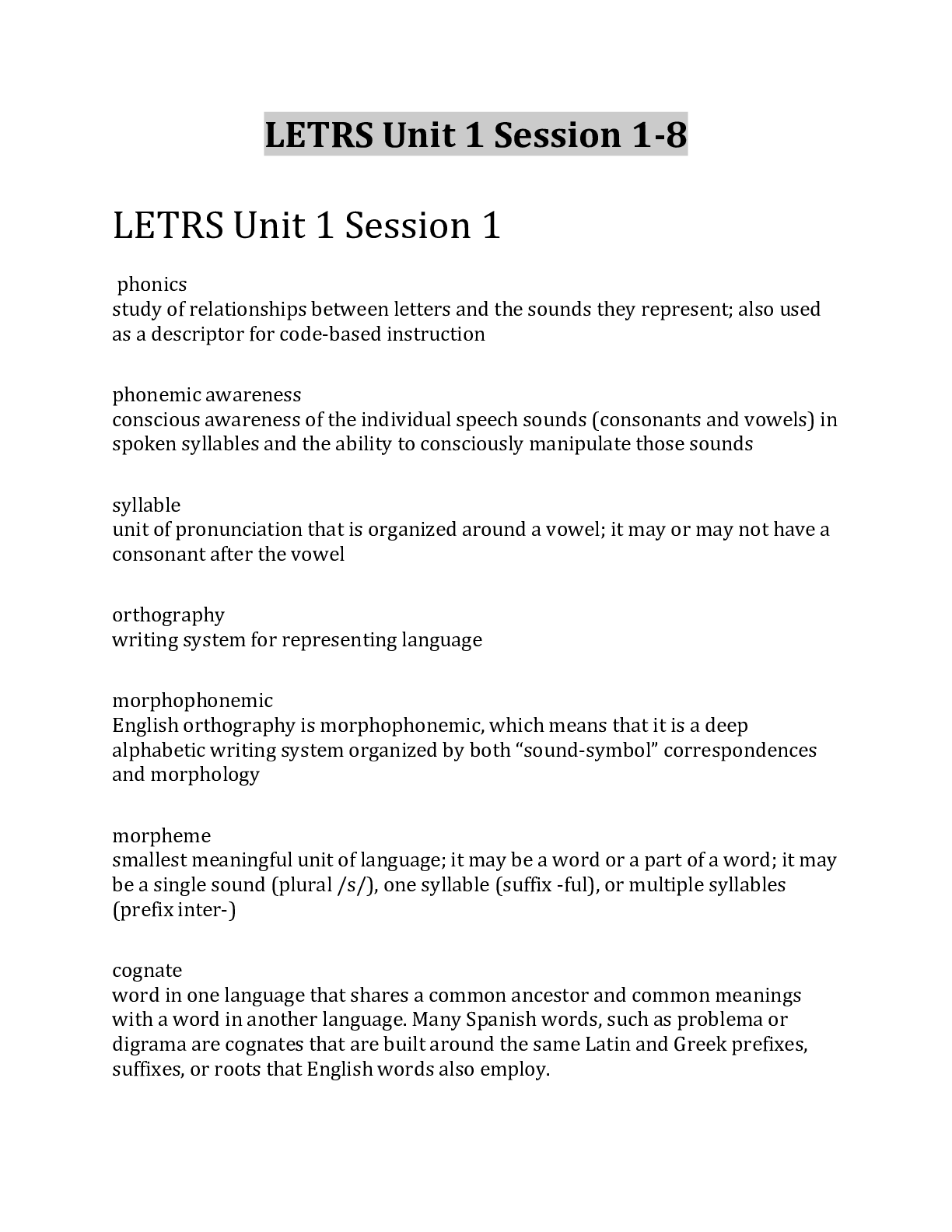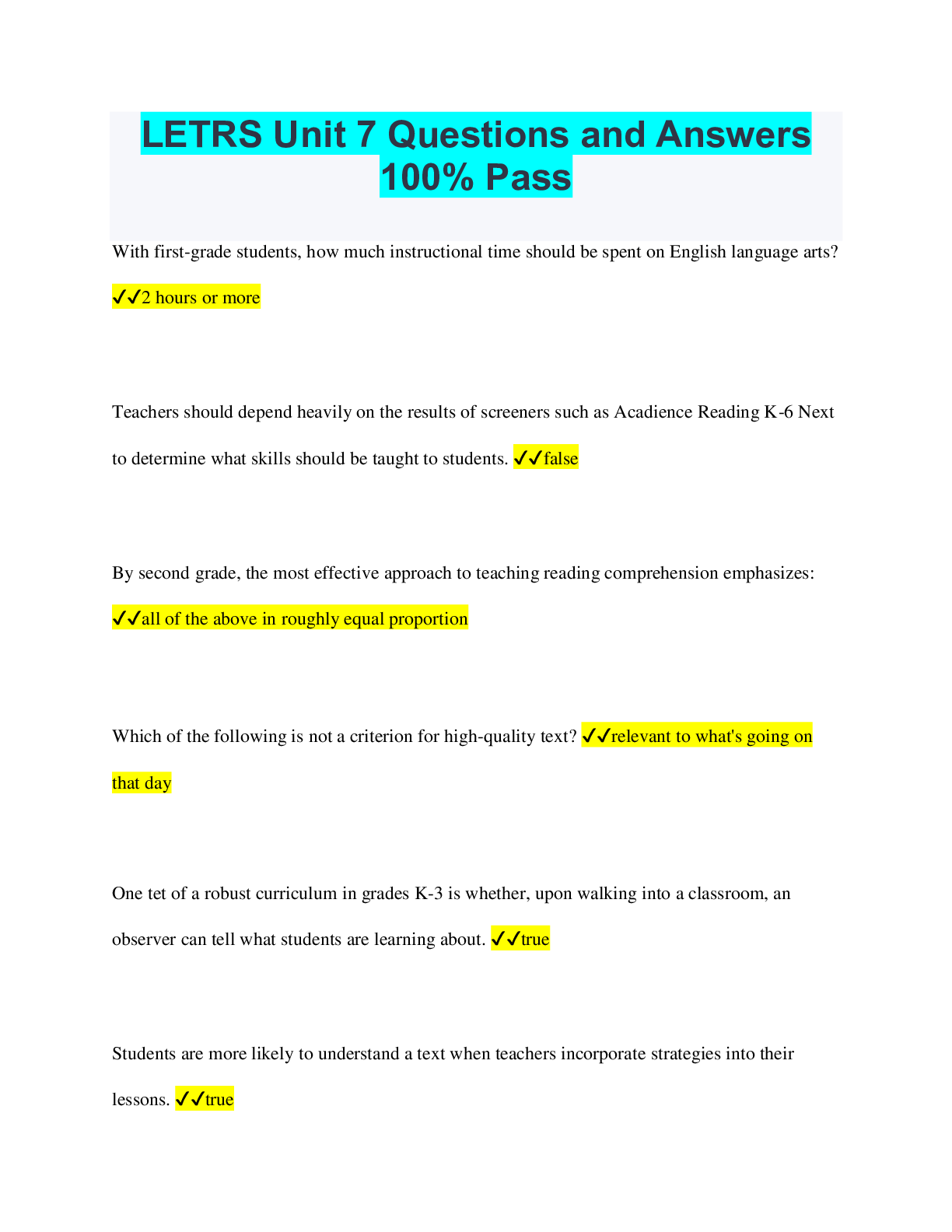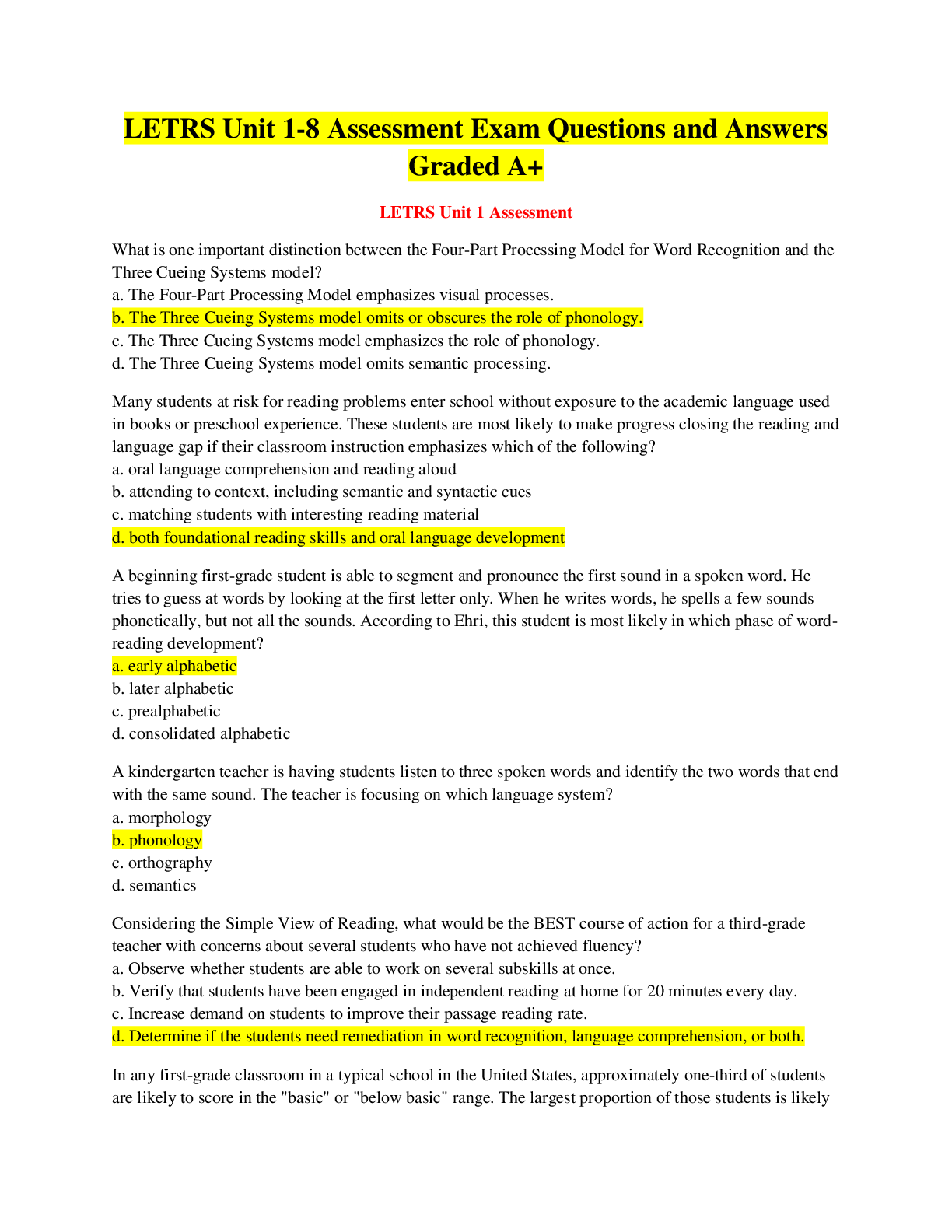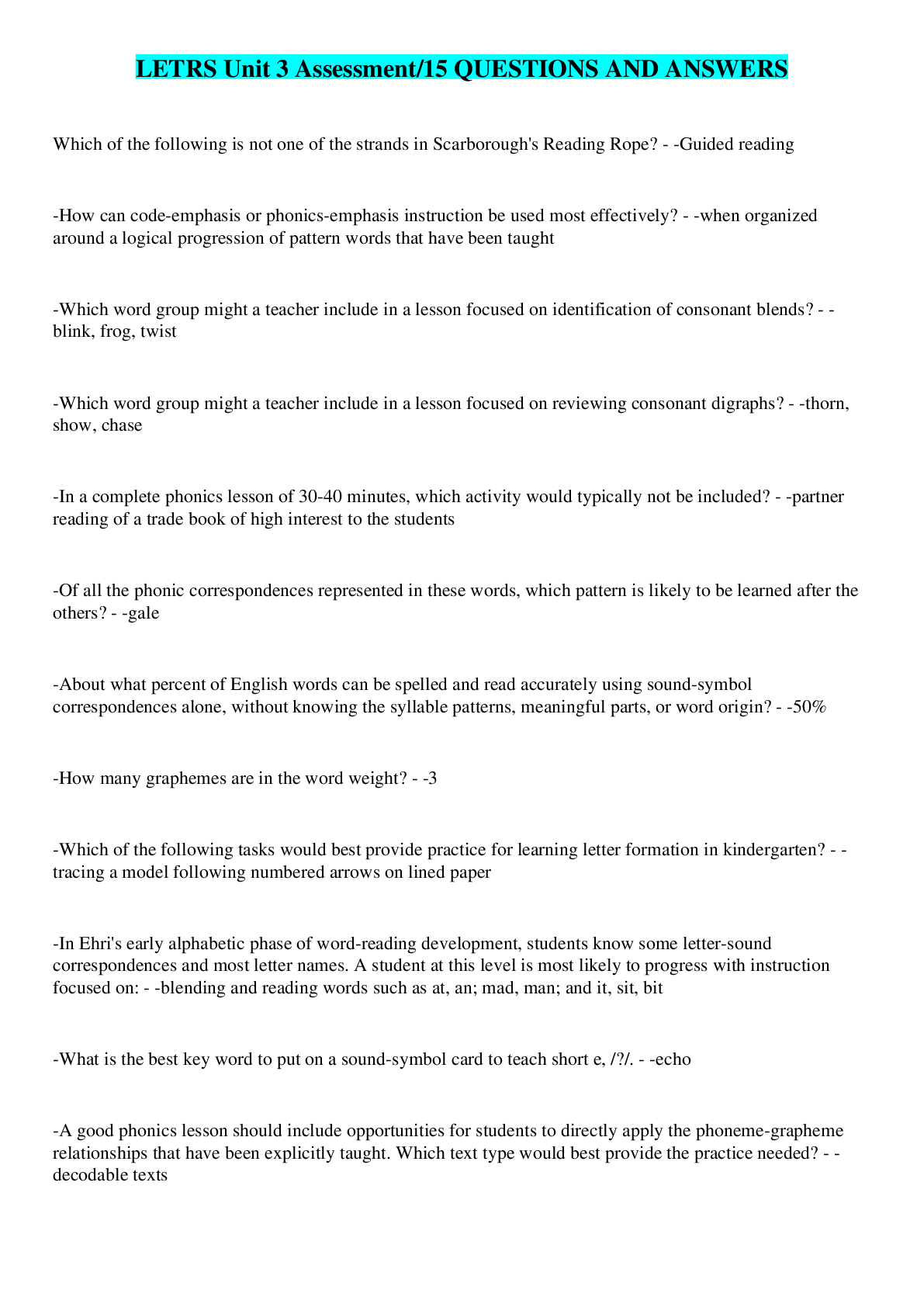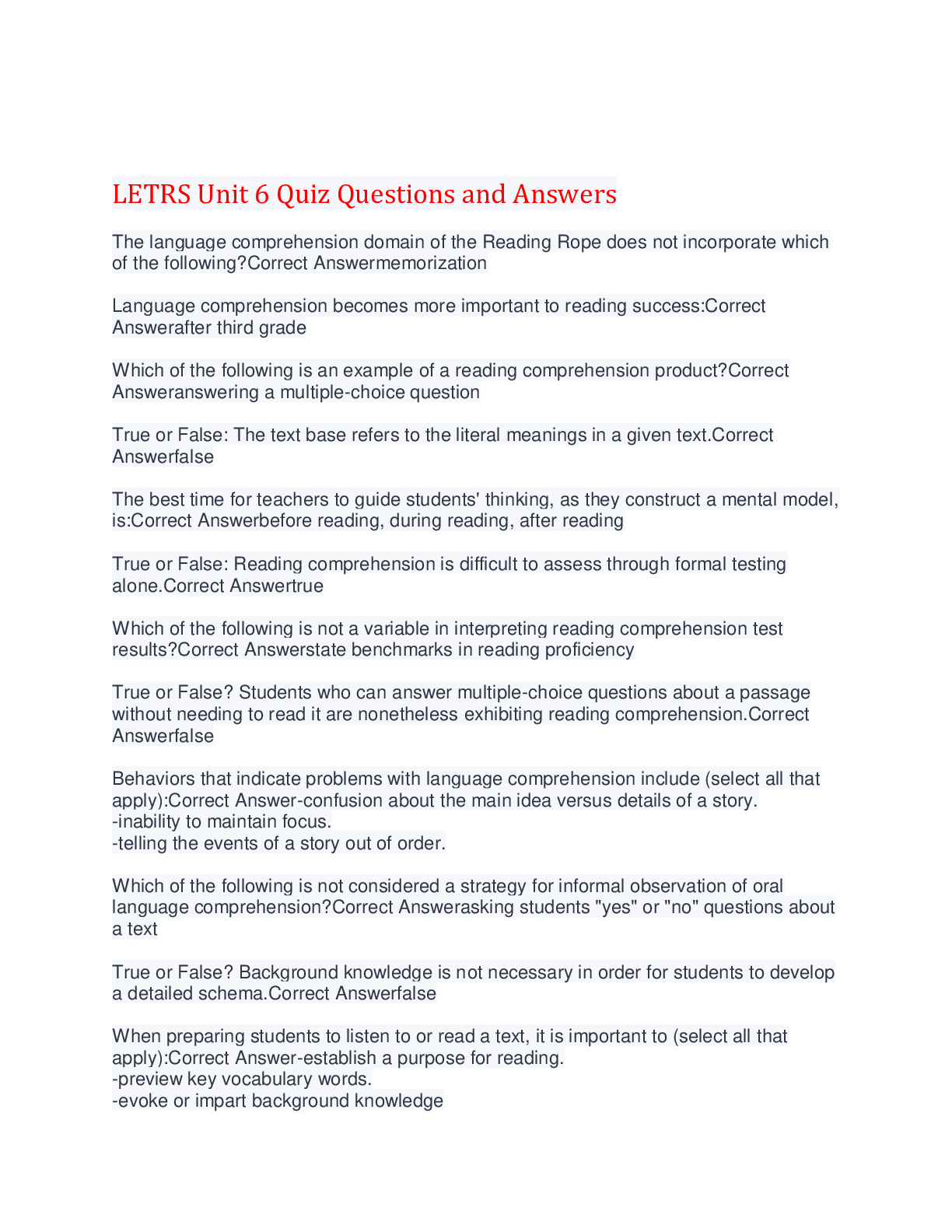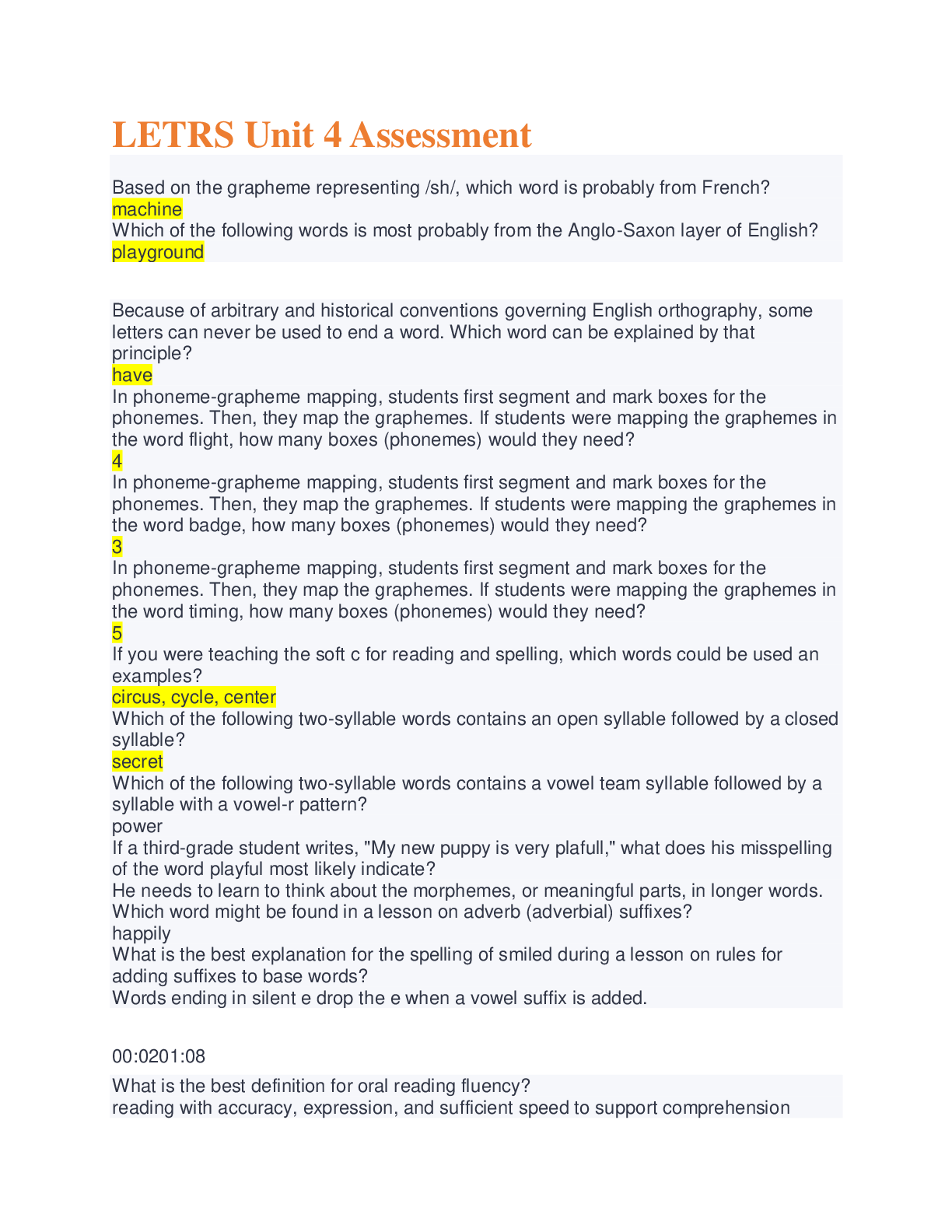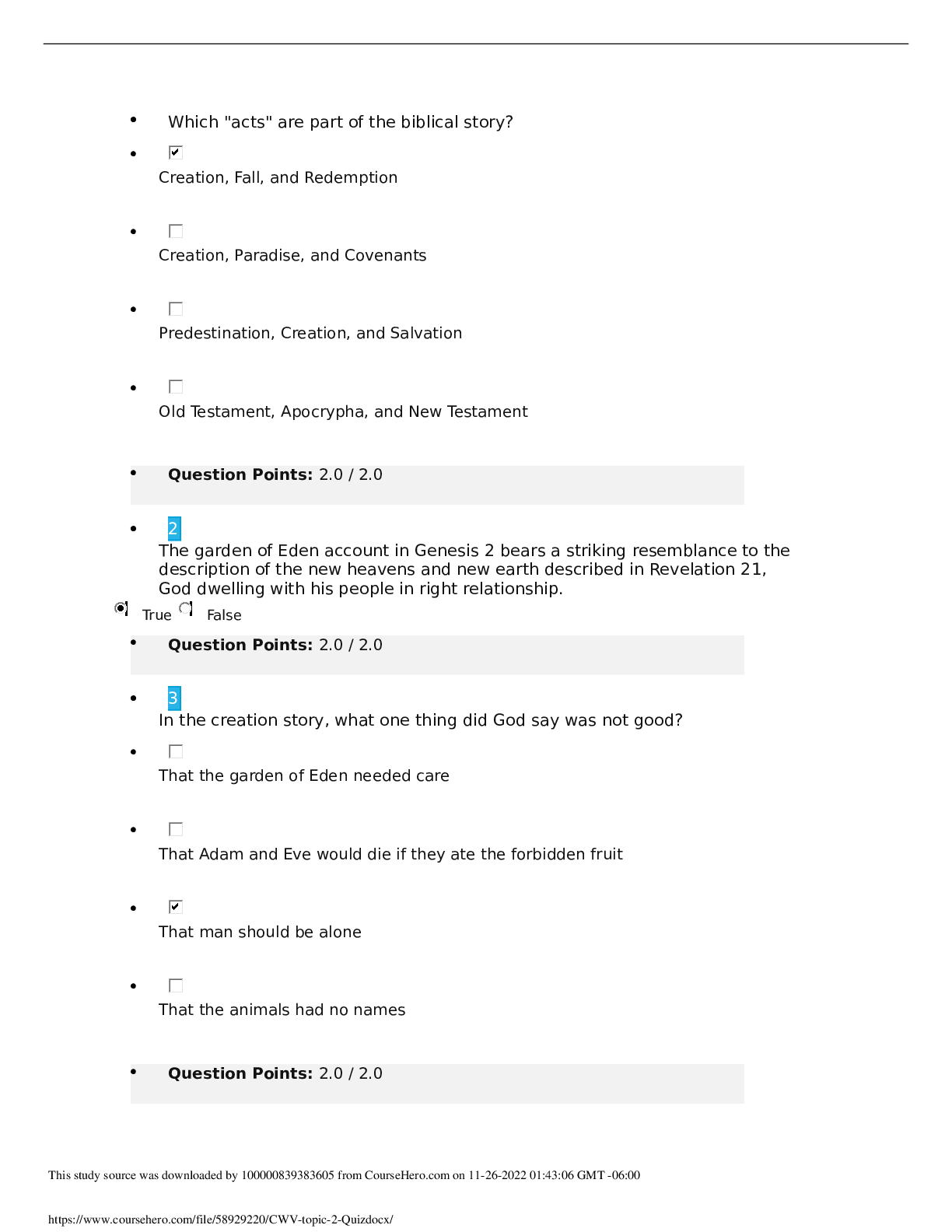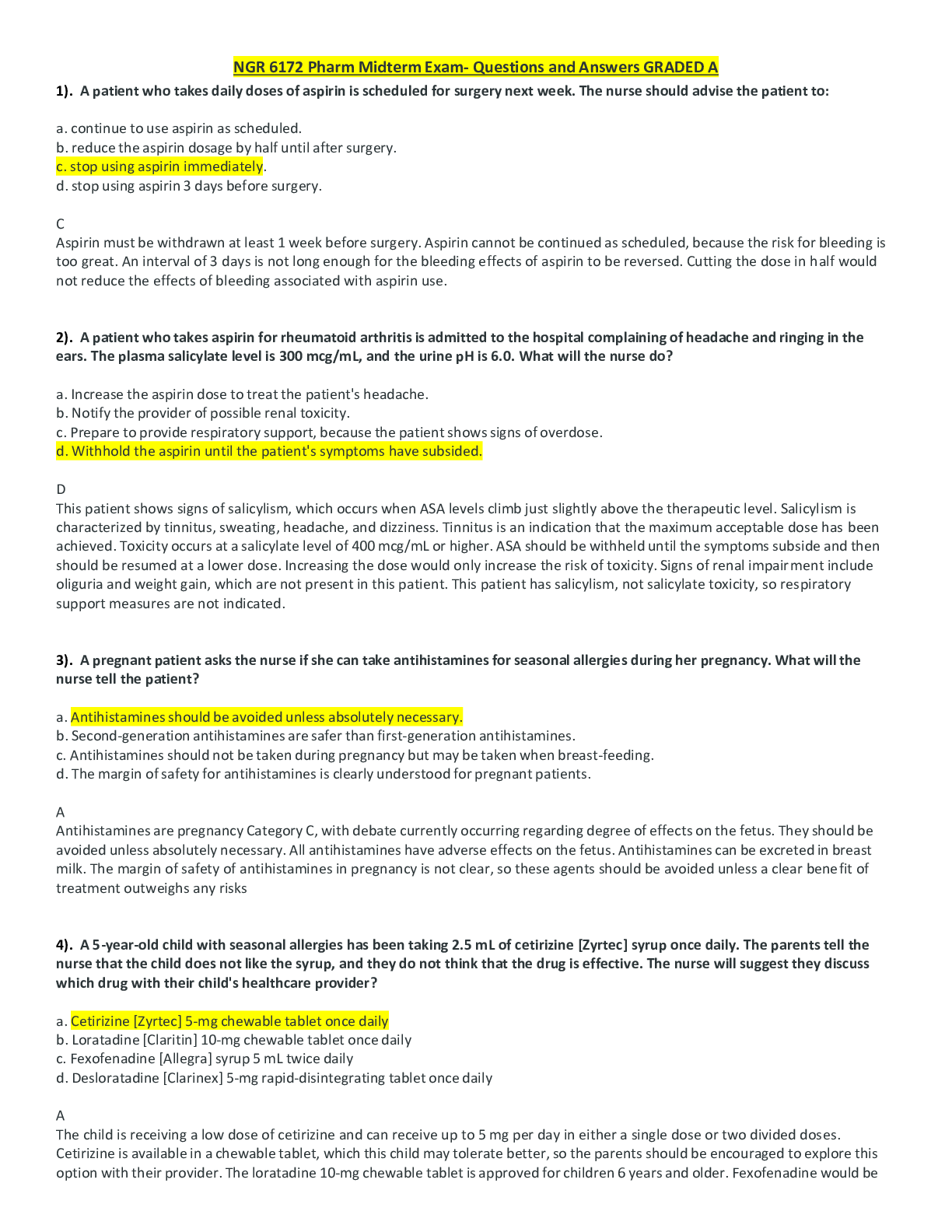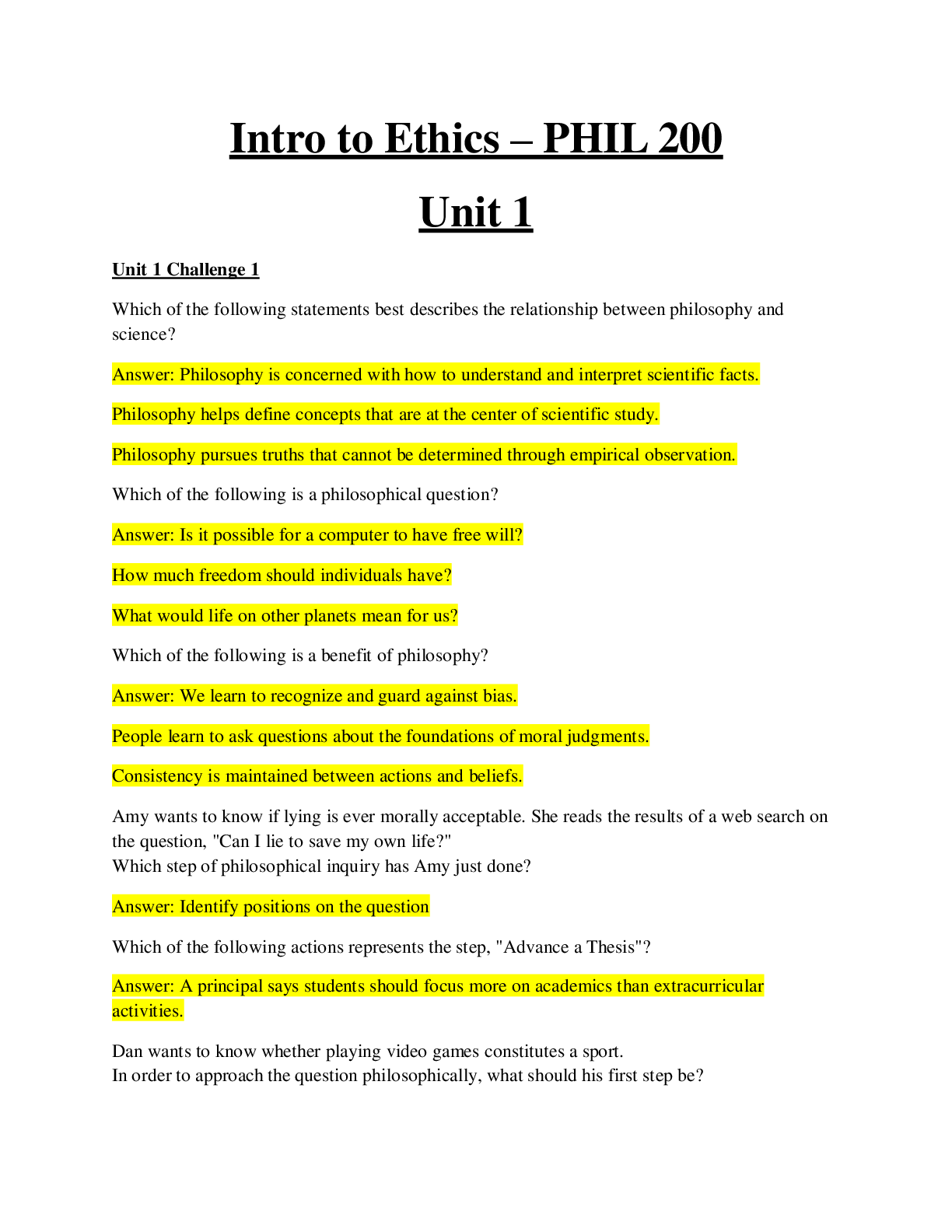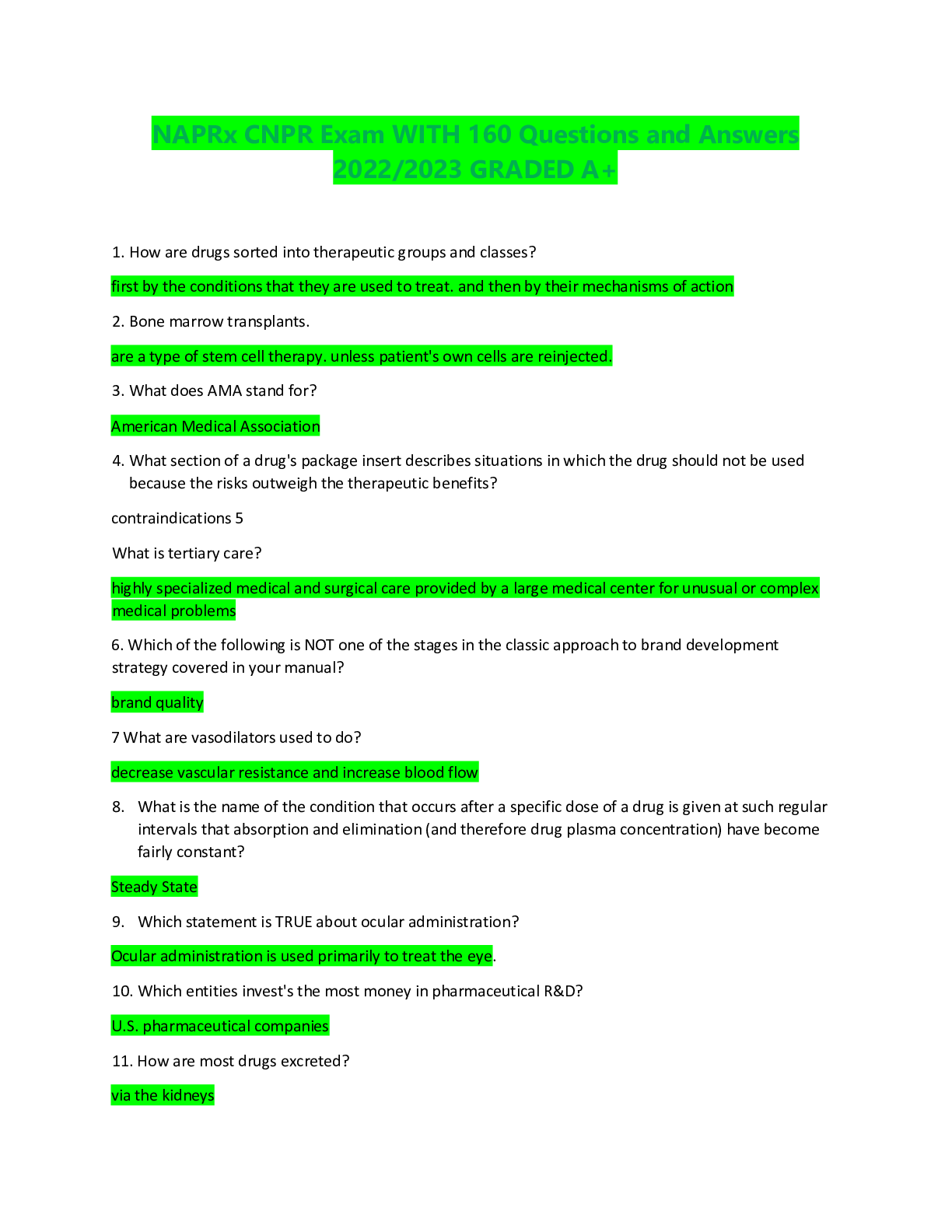Health Care > EXAM > Pharmacology C QUESTIONS AND ANSWERS GRADED A+ (All)
Pharmacology C QUESTIONS AND ANSWERS GRADED A+
Document Content and Description Below
Pharmacology C QUESTIONS AND ANSWERS GRADED A+ A client plans to stop smoking & has a prescription for buproprion. Which client statement indicates to the nurse that further teaching is required? 1.... "I should not stop smoking until I have taken the med for at least 1 week." 2. "I should not drink alcohol while taking the med." 3. "If I miss a dose of medication, I should take it as soon as I remember it." 4. "I should wear sunscreen when I'm out in the sun." Correct Answer: 3. If taking buproprion for smoking cessation, the client should omit missed doses & not try to "catch up." -Buproprion is used for the treatment of depression & smoking cessation. Side effects= HA, dry mouth, N&V. Taking the med for at least 1 week allows for the onset of the med effect to increase the client's chances of quitting. -Alcohol interacts w/ this med & can cause adverse rxns. -The med causes photosensitivity, so they need to wear sunscreen. The nurse understands that phentermine is prescribed MOST for which client? 1. A client who's diagnosed w/ obesity 2. A client who's dying 3. A client who's experiencing anorexia 4. A client who's abusing alcohol Correct Answer: 1. Phentermine is a short-term treatment for obesity. Side effects= CNS stimulation, HTN, & palpitations. -Phentermine isn't indicated for end-of-life care -The med is an appetite suppressant that causes weight loss -Alcohol & other CNS depressants should be avoided when taking this med An older adult client states, "I have been taking OTC cimetidine several times a day for 3 weeks for indigestion." Which additional client statement requires immediate follow up by the nurse? 1. "I should have called my HCP before taking." 2. "I don't have heartburn since taking this med." 3. "I take cimetidine at the same time I take antacids." 4. "My child tells me that I seen to be confused at times." Correct Answer: 4. Large doses of cimetidine can cause confusion in older adult clients. This requires immediate follow up by the nurse. Monitor VS, LFTs, & CBC. Cimetidine should be taken w/ meals to reduce acid secretion. -The client shouldn't take cimetidine for over 2 weeks w/out consulting a HCP. The nurse will follow up but this isn't the priority. Side effects= diarrhea, dizziness, & hepatic abnormalities. -Cimetidine is used to treat duodenal ulcers & benign gastric ulcers & to treat GERD. -Instruct the client not to take antacids w/in 30-60 min of taking cimetidine. The nurse will follow up, but this isn't the priority. The nurse instructs a client diagnosed w/ bipolar disorder receiving lithium 300 mg 3x/day. The nurse determines that teaching is effective if the client makes which statement? (SELECT ALL). 1. "I can still have my coffee." 2. "I should increase my exercise." 3. "I can sit in a hot bath." 4. "I will eat a moderate amount of sodium." 5. "I need to drink between 2-3 L of fluid daily." Correct Answer: 4 & 5. The client requires an adequate amount of sodium intake (6-10 g/day). The client should consume 2-3 L of fluid daily. -Caffeine use should be avoided due to its diuretic effect. Lithium is an antimanic med. Side effects= dizziness, HA, impaired vision, fine hand tremors, & reversible leukocytosis. -Increased exercise can cause excessive sodium loss, which can cause toxicity. Early s/s of toxicity= N&V, & diarrhea. The client will be encouraged to maintain activity, but not increase exercise. -Sitting in a hot tub of being excessively warm environment will increase perspiring, which can cause excess sodium loss. A client diagnosed w/ acute gout has been taking daily ibuprofen as prescribed for 4 weeks. The client tells the nurse that a ringing sound has developed in the ears. Which is the best interpretation by the nurse? 1. S/s of gout include tinnitus, & the client should increase the dose of ibuprofen. 2. Gout causes problems w/ joints, not ears, so the client should consult an audiologist 3. The client has s/s of toxicity & should d/c the med until the HCP is contacted 4. Unpleasant ear sounds are a complication of gout & will decrease w/ time Correct Answer: 3. Aspirin & NSAIDs like naproxen (Aleve) & ibuprofen (Motrin, Advil) are known to cause ringing in the ears (tinnitus). While it's possible the symptom is D/T another cause, the client should stop the med & consult w/ the HCP. -Ringing in the ears is a possible sign of damage to the tympanic membrane & may be R/T ibuprofen use. -The first action is to consult w/ the prescribing HCP & rule out a medication-caused side effect. NO need to contact a specialist yet. -Unpleasant ear sounds such as tinnitus aren't R/T gout. The home health nurse provides care for a client w/ T1DM who receives insulin therapy in a 4-dose protocol. If the client injects rapid-acting insulin SQ at 1145, the nurse knows the peak action of this insulin will occur at which time? 1. 1200 to 1215 2. 1245 to 1315 3. 1445 to 1545 4. 1745 to 1945 Correct Answer: 2. The peak action of rapid-acting insulin is 1-1.5 hrs or around 60 min after administration. The dose based on anticipated intake of carbohydrates. -Rapid-acting insulin is administered 15 min before meals. The onset of action is 15-30 min -The duration of rapid-acting insulin is 3-5 hrs. The client will also require a longer-acting insulin for basal insulin requirement -The duration of regular insulin administered SQ is 6-10 hrs. The onset of regular insulin= 30-60 min & the peak= 1-5 hrs. A client has filled a prescription for dorzolamide for glaucoma. The nurse knows the client needs additional education if they make which statement? 1. "I have a bitter taste in my mouth a short time after I instill the eye drops." 2. "Although I had a reaction to sulfa medication , I don't need to worry about eye drops." 3. "I carry the drops w/ me when I go on long day trips, so I can instill them at the correct time." 4. "I can expect to use eye drops for a long time to prevent permanent damage to my eyes." Correct Answer: 2. Clients allergic to sulfa meds must no take any form of that med, including topical, as some absorption takes place & can cause a systemic reaction. -Dorzolamide (Trusopt)= a carbonic anhydrase inhibitor that reduces the amount of fluid in the eye. It's used for the treatment of glaucoma & other ocular HTN. It's administered topically in the eye, & some is absorbed systemically; side effects= ocular discomfort, dryness, & a bitter taste in the mouth. -The pt shold take the drops w/ them on long day trips -Glaucoma is a chronic condition. Prolonged increased intraocular pressure could cause atrophy of the optic nerve & retina; therefore, decreasing the intraocular pressure by medication is necessary. A client receives a script for promethazine. The nurse knows that promethazine is prescribed for which situations? (SELECT ALL) 1. Going on a cross-ocean cruise 2. Having an elective operation 3. Preventing leg cramps at night 4. Enhancing pain medication after surgery 5. Managing HTN 6. Treating ventricular tachycardia Correct Answer: 1, 2, & 4. Promethazine is an antiemetic used for lost of things- managing motion sickness, decreasing N&V after invasive procedures, preoperative sedation. Causes sedation, which, when given w/ a pain med, lessens the perception of discomfort. Side effects= confusion, disorientation, & sedation. -Promethazine isn't used for muscular cramping, HTN, or treating dysrhythmias. The nurse identifies which medication is used for the treatment of parkinson disease? 1. Trihexyphenidyl 2. Meclizine 3. Fexofenadine 4. Donepezil Correct Answer: 1. Trihexyphenidyl is an anticholinergic med that is used in conjunction w/ L-dopa to help counteract the spastic effects of Parkinson. Side effects= dry mouth, blurred vision, constipation, urinary hesitancy, & decreased mental acuity. -Meclizine is an antiemetic used for the treatment of vertigo & motion sickness. Side effects= drowsiness, dry mouth, blurred vision, excitation, & restlessness -Fexofenadine is an antihistamine used to treat rhinitis, allergy symptoms, & chronic urticaria. Side effects= drowsiness, fatigue, & dyspepsia -Donepezil is a neurological medication used to stabilize or relieve symptoms of mild to moderate dementia. Side effects= HA, diarrhea, & nausea [Show More]
Last updated: 1 year ago
Preview 1 out of 7 pages
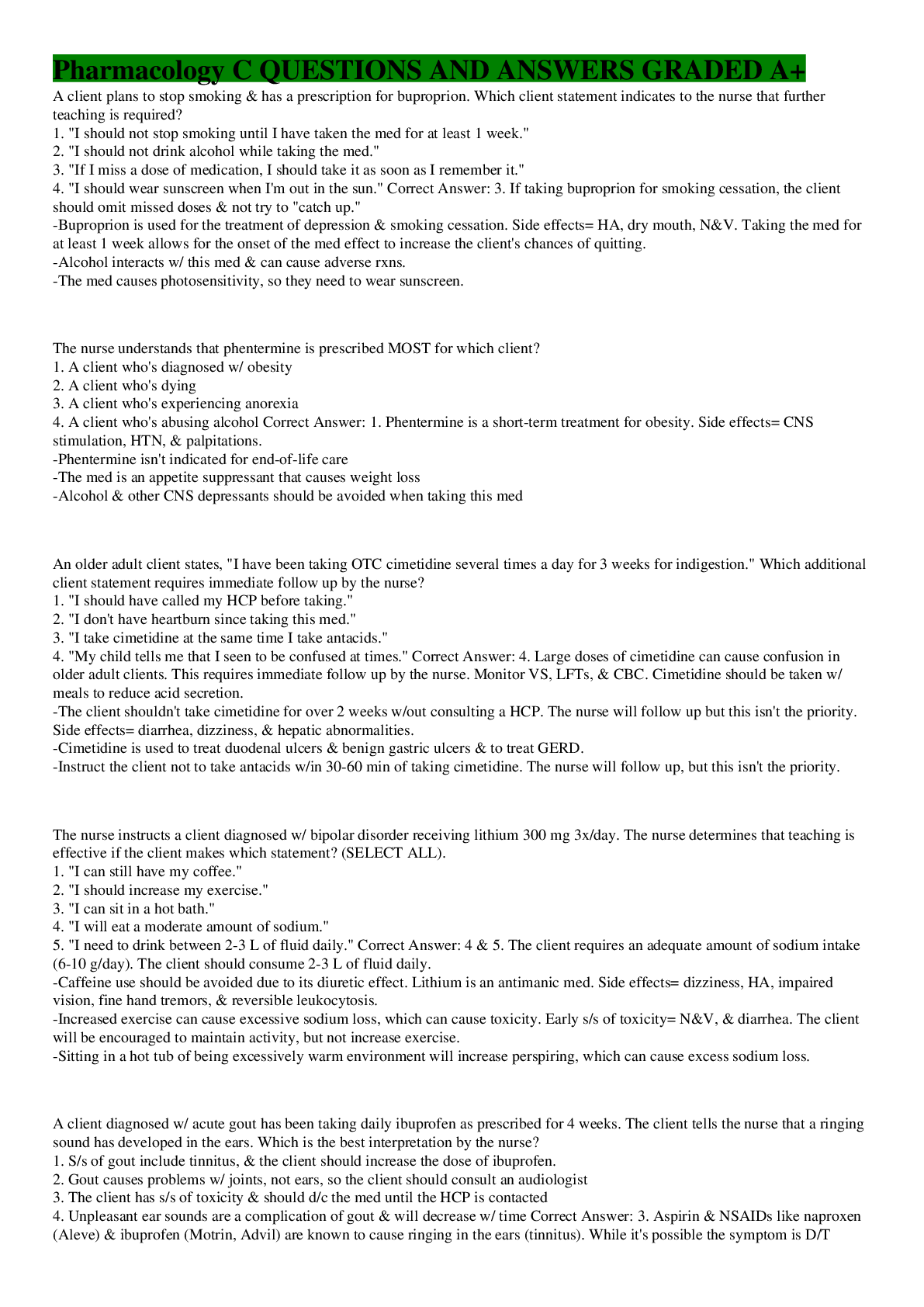
Reviews( 0 )
Document information
Connected school, study & course
About the document
Uploaded On
Aug 11, 2022
Number of pages
7
Written in
Additional information
This document has been written for:
Uploaded
Aug 11, 2022
Downloads
0
Views
40

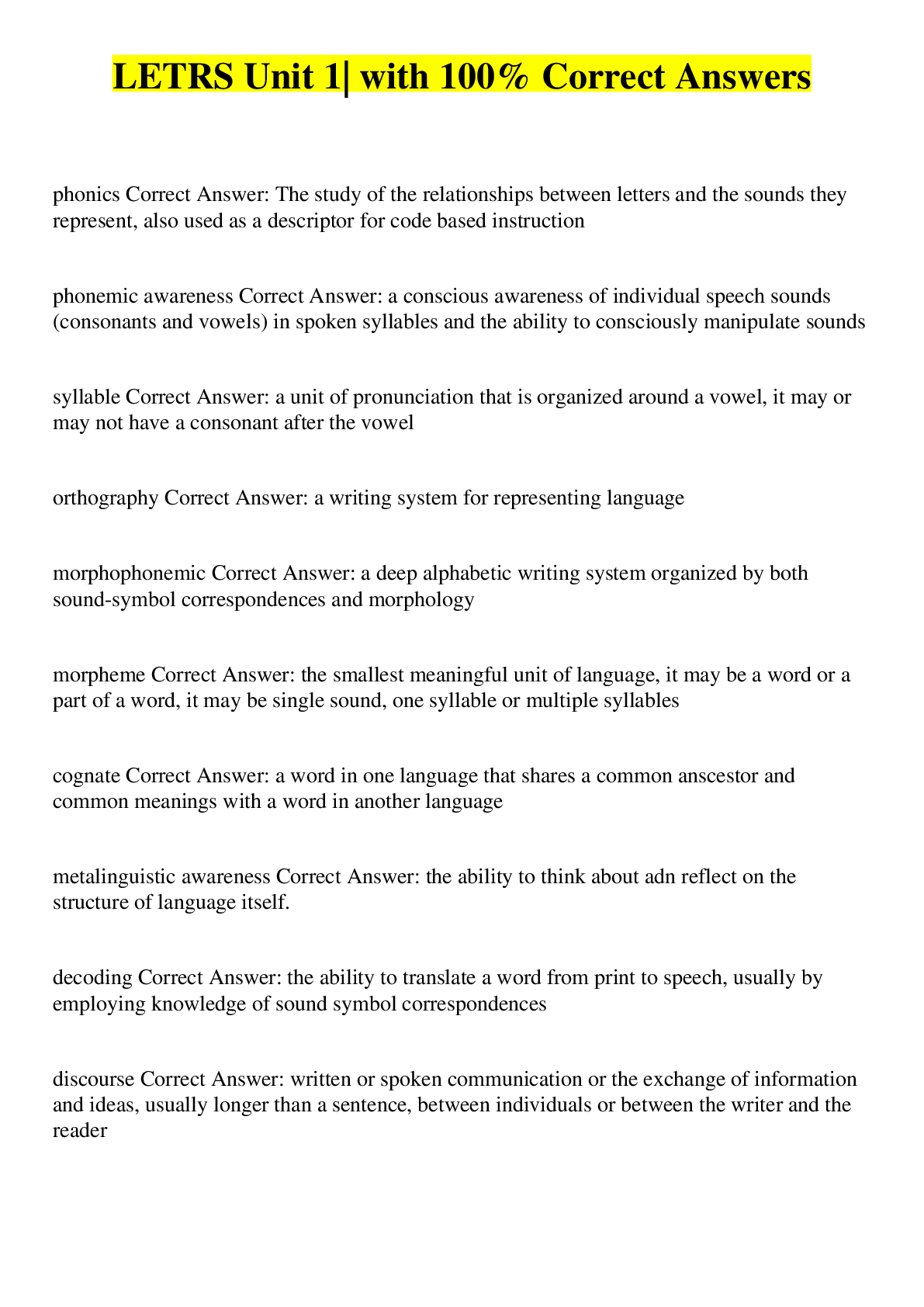
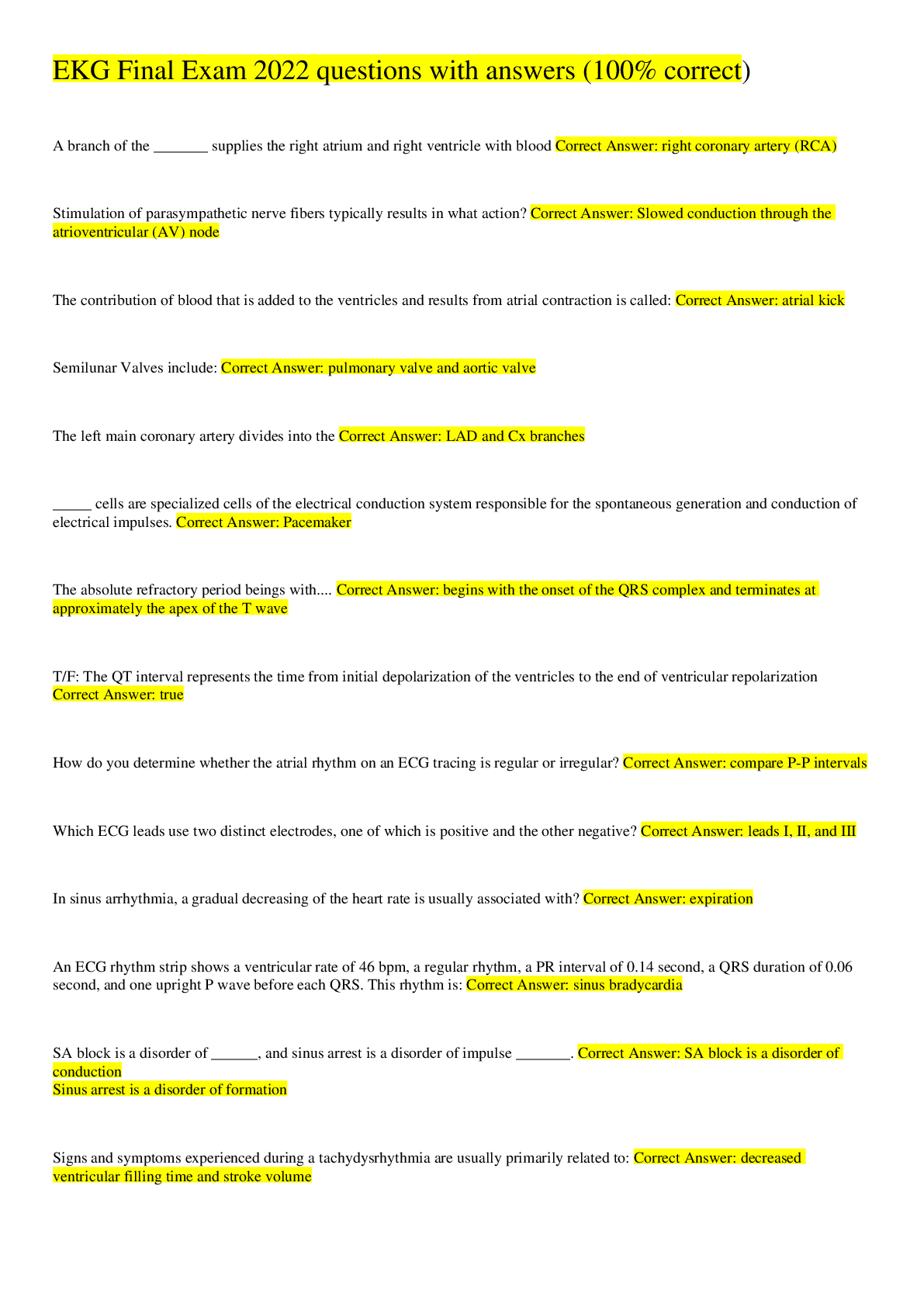
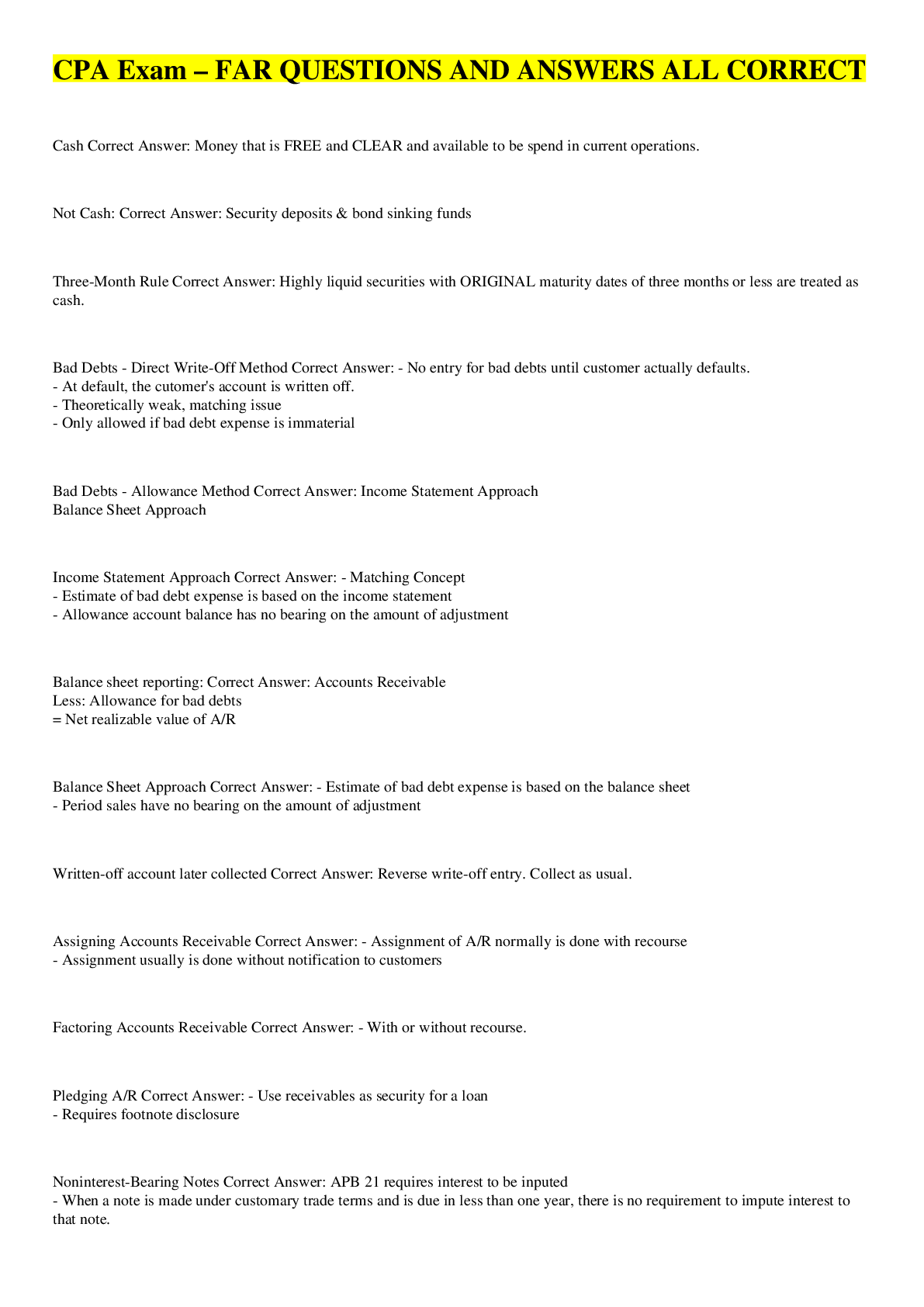
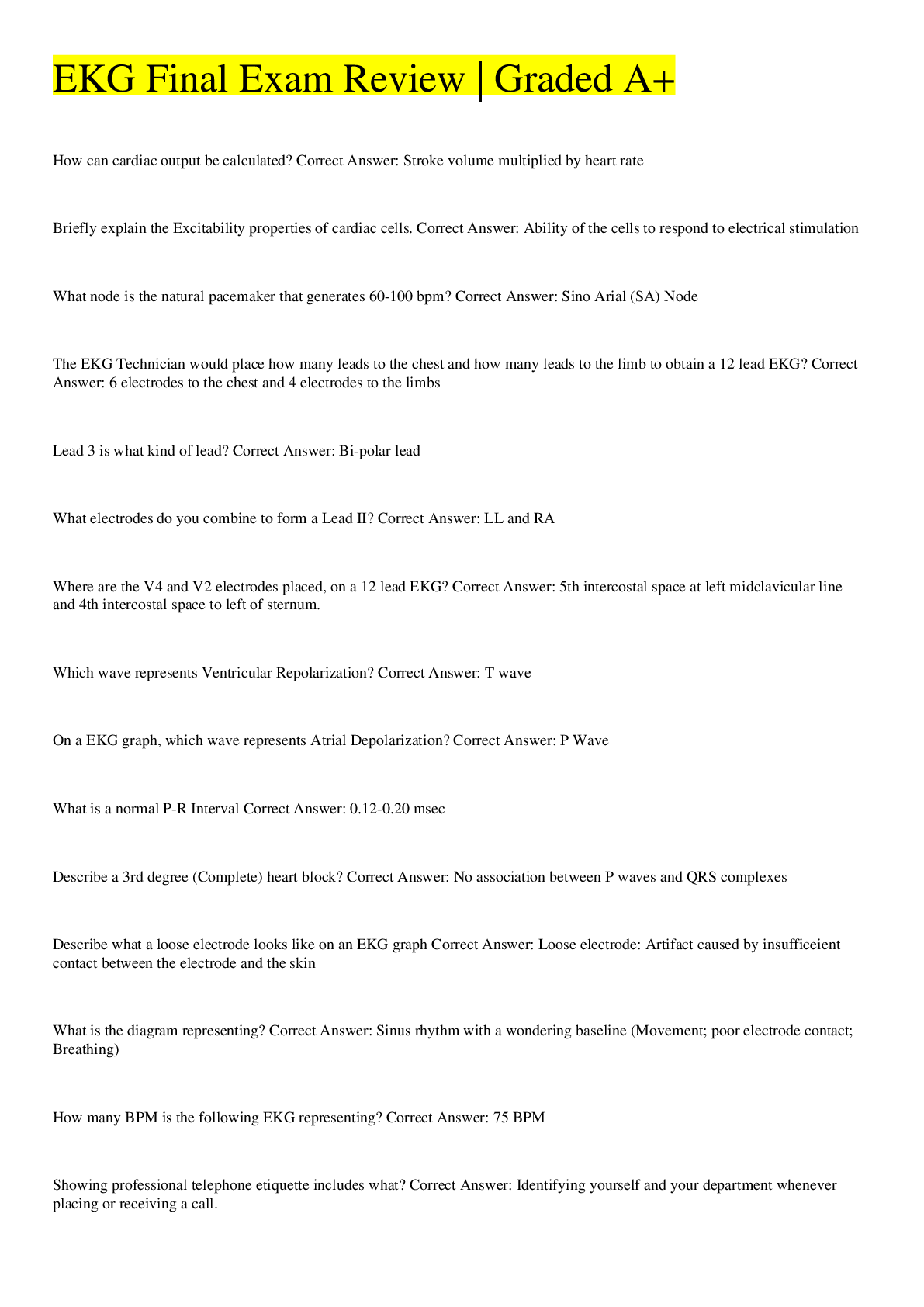
.png)
